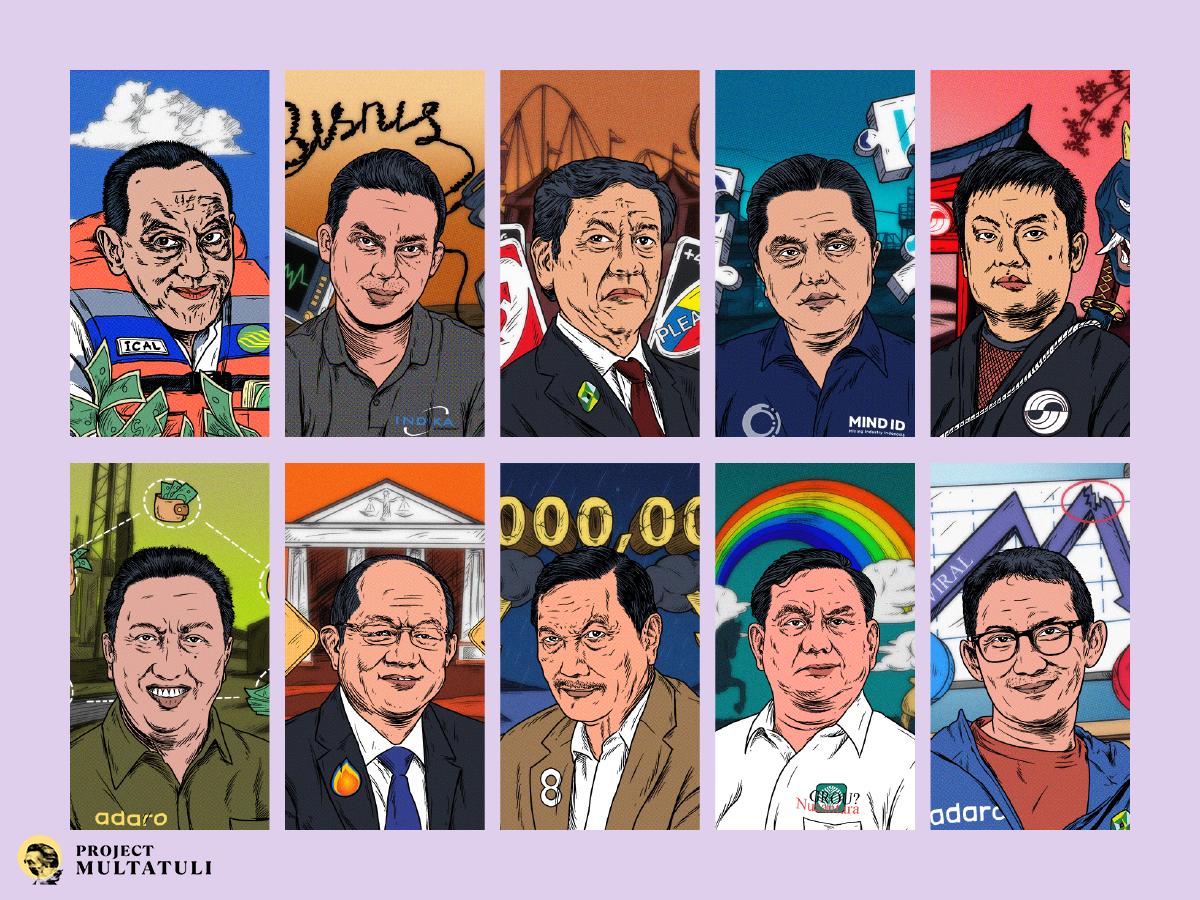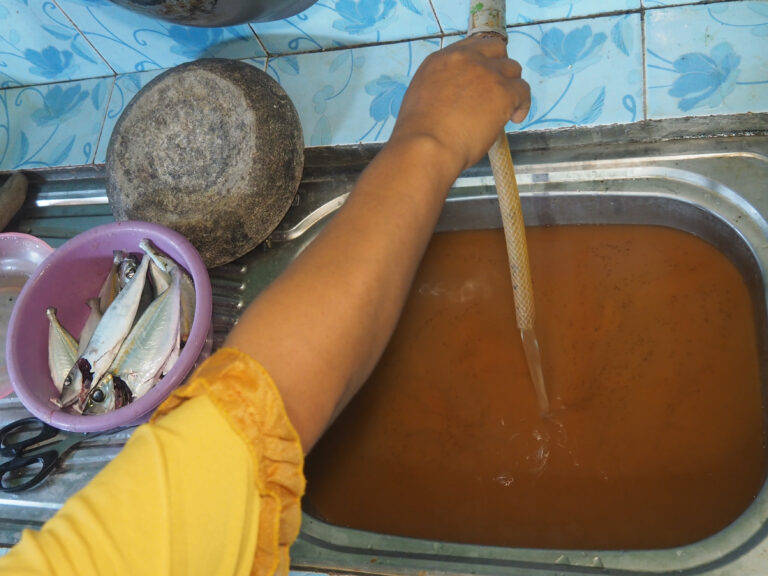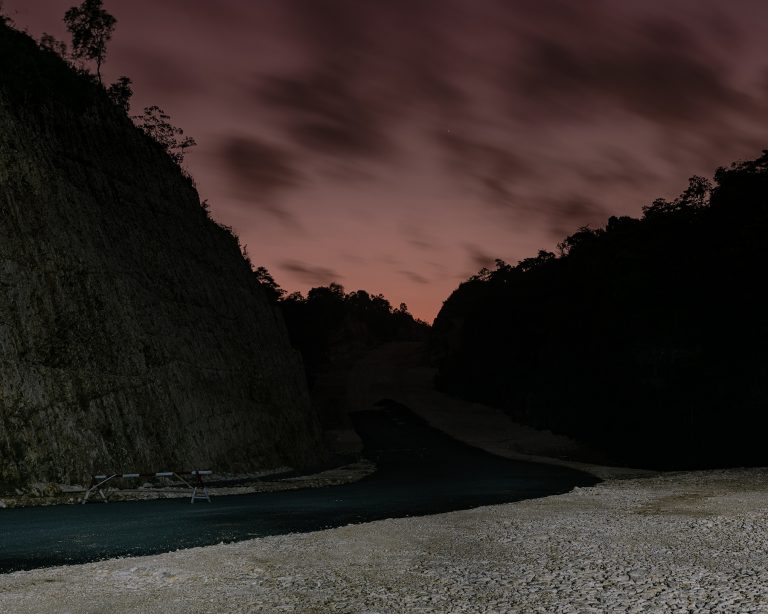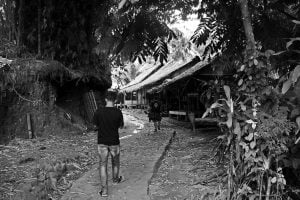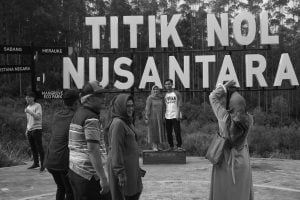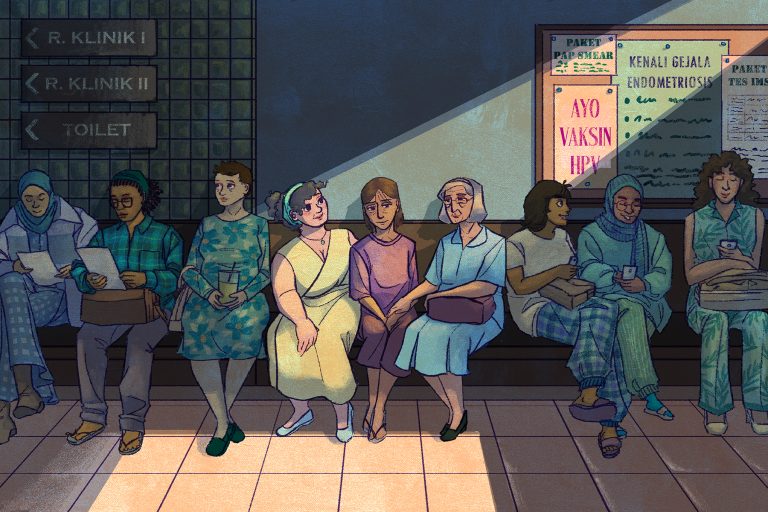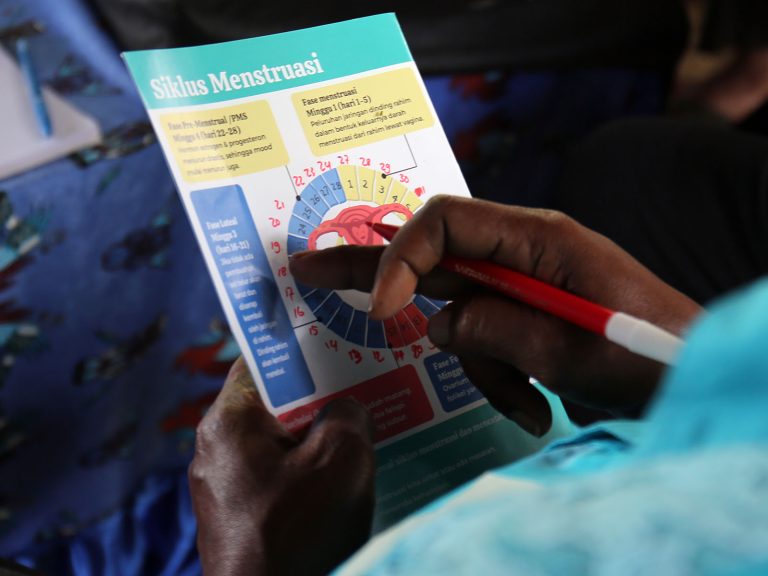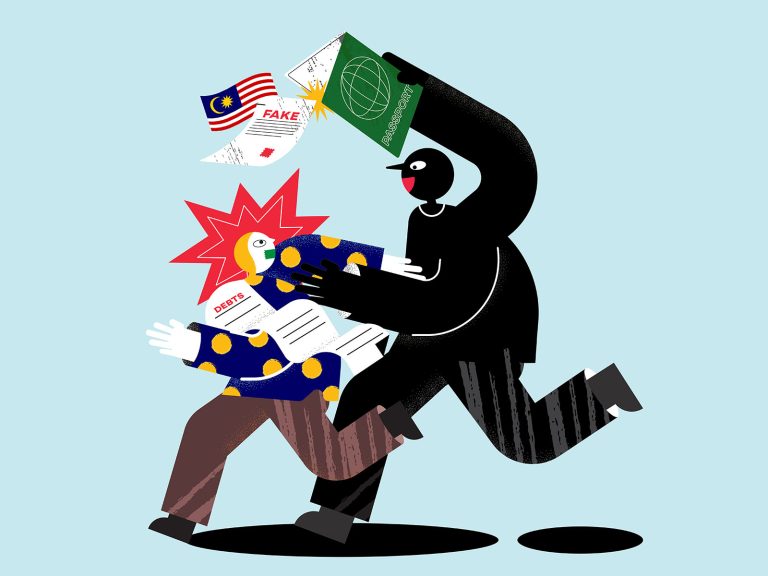In Indonesia, coal has long been exploited to satisfy the avarice of those in power.
Prior to the country’s independence, in 1861, the Dutch colonial government began mining coal in Palaran, East Kalimantan, before kicking off production in Ombilin, West Sumatra, in 1892.
In fact, Kalimantan and Sumatra islands are Indonesia’s “supermarket” of coal. As of 2020, coal reserves on the two islands reached 25.84 billion tons and 12.96 billion tons, respectively, while their coal resources stood at 88.31 billion tons and 55.08 billion tons.
In 1976, then Indonesian president Soeharto issued a decree to prioritize the rehabilitation of mining facilities to boost national coal production. Global coal demand was on the rise following the 1973 Arab oil embargo. However, the real momentum came in the early 1990s after Soeharto reopened Indonesia’s coal mining sector for foreign investment. Ever since, the country’s annual coal production kept soaring from one year to another, from merely 13 million tons in 1991 to 606.7 million tons in 2021.
By the end of 2021, there were 66 coal miners operating in Indonesia under the old system of work contracts (PKP2B) and 1,162 under the more contemporary mining business permits (IUP).
Indonesia uses its own coal to fuel steam power plants and various domestic industries. As of 2021, the capacity of the nation’s power plants reached 74 gigawatts (GW), of which 37 GW, or 50%, came from coal facilities. Indonesia needed a total of 113 million tons of coal to operate all of its steam power plants.
Based on the US Energy Information Administration (EIA) calculations, every million tons of coal burned emit up to 3.17 million tons in carbon dioxide, meaning that Indonesia’s coal facilities could release 358 million tons of CO2 in 2021.
Coal burning generates a large quantity of harmful pollutants and chemicals. According to a 2015 study by Harvard University and Greenpeace, Indonesia’s coal power stations caused an estimated 6,500 premature deaths annually. The number was projected to increase to 15,700 in line with the development of new coal facilities across the nation.
Moreover, coal mining activities pose a threat to health and environment. Examples include Muara Enim, a regency with the largest coal reserves in South Sumatra, where state-owned coal miner PT Bukit Asam mainly operates. There, rivers are polluted, floods and landslides occur routinely, forest areas and agricultural lands are shrinking, land conflicts are common, illegal mining is everywhere, and locals are vulnerable due to the poor quality of their health.
In spite of all this, Indonesia today still puts a premium on coal, which is seen as the cheapest energy source. The coal business is deemed essential by the government, as it helps boost non-tax state revenue and ease the country’s trade deficit. And, certainly, it makes the rich richer.
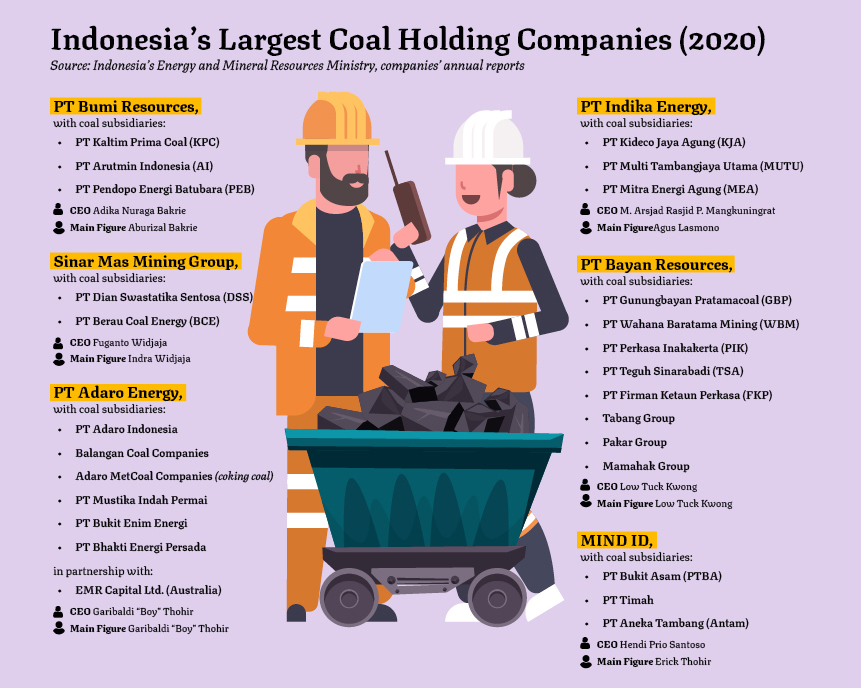
The presence of a number of coal oligarchs with strong networks and political influence in the government led to a policy flip-flop on some crucial energy and mining measures in the past several years. The government canceled a plan to cap annual coal production at 400 million tons starting in 2019. It also backtracked on the coal export ban within less than two weeks after the policy was announced at the end of 2021.
As of 2020, Indonesia’s five biggest coal holding companies or business groups were PT Bumi Resources, run by the Bakrie family, Sinar Mas Mining Group, owned by the Widjaja family, PT Adaro Energy, controlled together by the Thohir and Soeryadjaya families, PT Indika Energy, steered by the Sudwikatmono family and PT Bayan Resources, led by Low Tuck Kwong. State-owned mining holding firm Mining Industry Indonesia (MIND ID) only sat sixth place. The list is based on data from the Energy and Mineral Resources Ministry, annual reports and official websites of numerous mining firms, as well as information published by various news outlets.
At least eight oligarchs now control those six coal business groups, namely Aburizal Bakrie, Fuganto Widjaja, Sandiaga Uno, Edwin Soeryadjaya, Garibaldi “Boy” Thohir, Erick Thohir, Agus Lasmono, and Low Tuck Kwong. In addition, there are other businessmen with relatively low coal production volumes, yet with strong networks in circles of tycoons, politicians, military officers, and government elites. They are Prabowo Subianto and Luhut Binsar Pandjaitan.
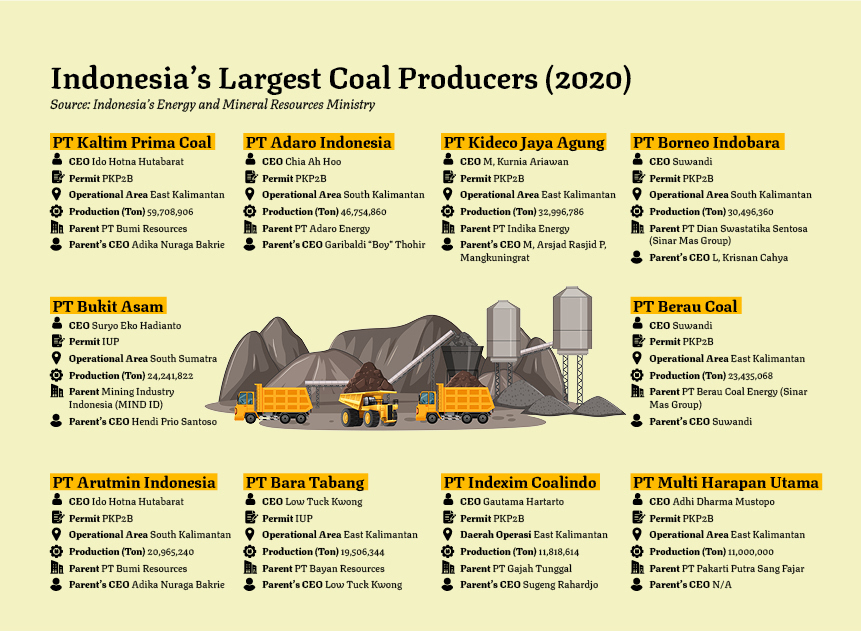
Indeed, Indonesia has Airlangga Hartarto, Surya Paloh, and Hary Tanoesoedibjo, chairmen of three different political parties who also have coal businesses. However, the size of their coal businesses is relatively small as they earn a bigger fortune in other sectors. Despite his current post as Coordinating Minister for Economic Affairs, Airlangga does not have a strong military network like Prabowo and Luhut. Hence, he is not a “complete package.”
Here are the short profiles of the 10 most influential coal oligarchs in Indonesia:
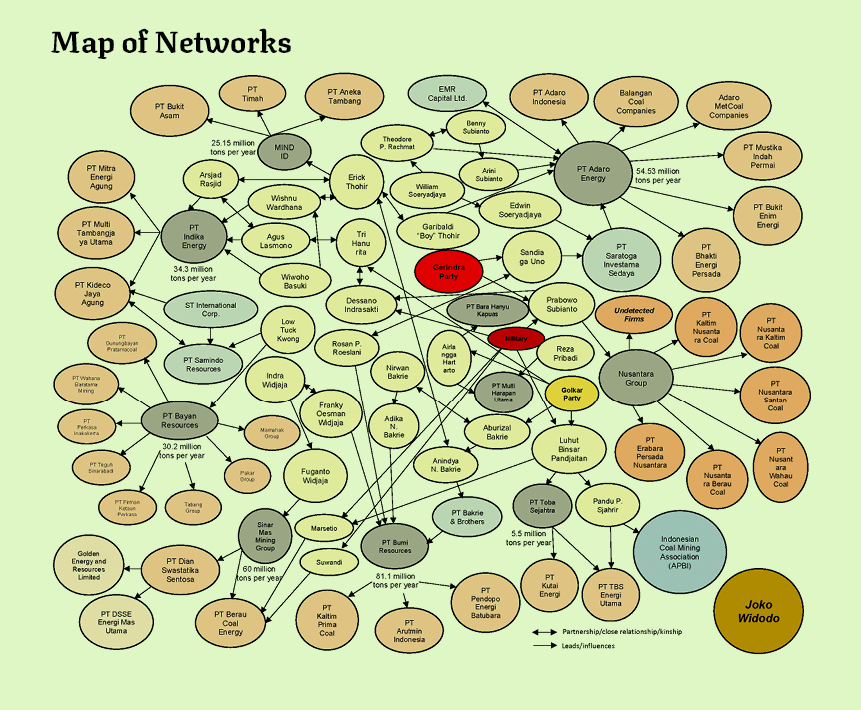
1. Aburizal Bakrie
Coal holding company: PT Bumi Resources
Mining capacity: 81.1 million tons of coal in 2020
Concession size: 136,985 hectares across East and South Kalimantan as well as South Sumatra in Indonesia
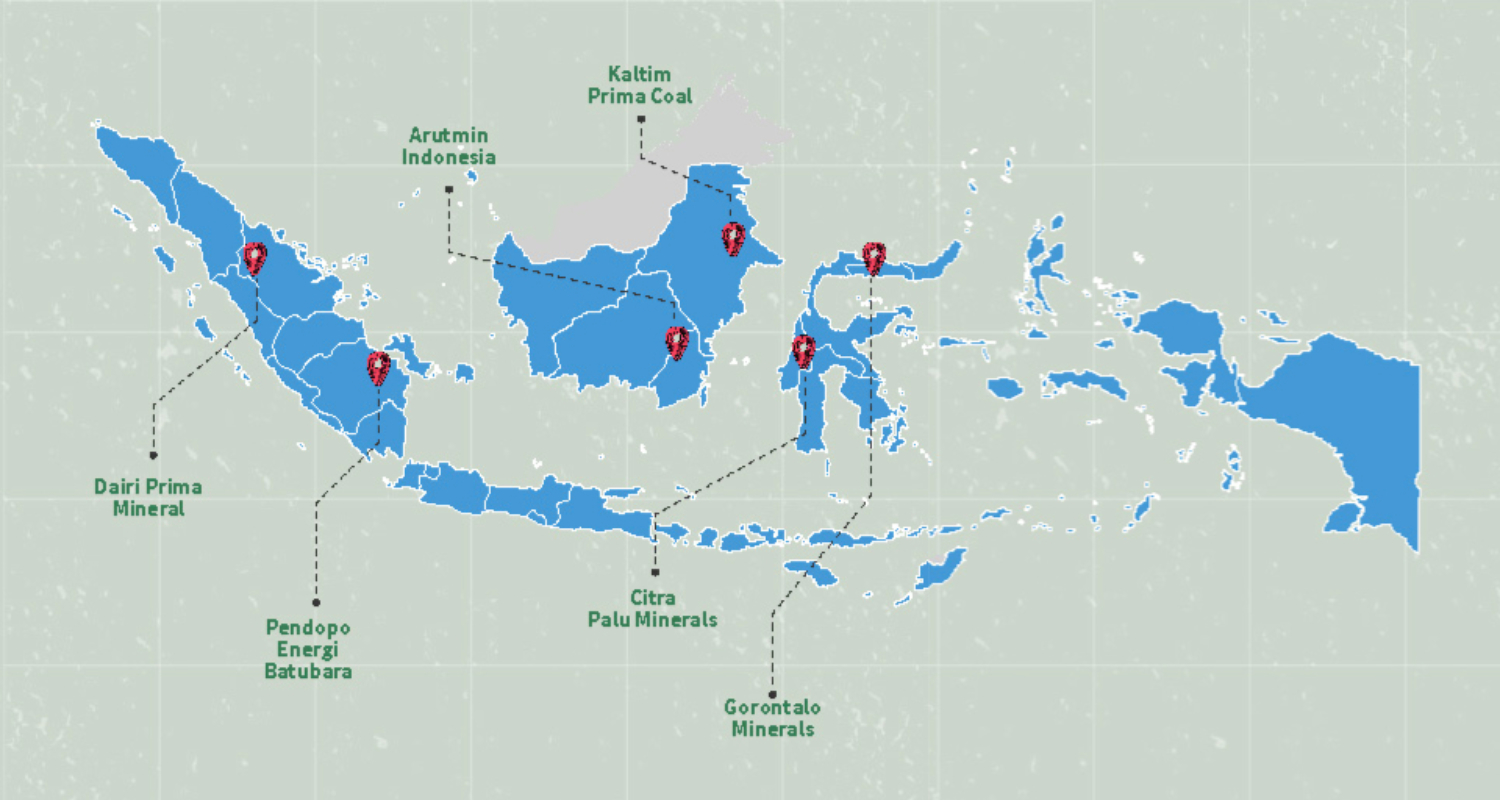
Aburizal Bakrie, familiarly called Ical was born in Jakarta on November 15, 1946. Ical is the eldest son of Achmad Bakrie, the founder of the Bakrie Group business. Ical entered his father’s business in 1972 by serving as an assistant to the board of directors of Bakrie Group’s holding company PT Bakrie & Brothers. In 1992, Ical was appointed president commissioner of the Bakrie Group, a position that he eventually abandoned in 2004, upon being appointed Coordinating Minister for Economic Affairs in 2004 by former President Susilo Bambang Yudhoyono.
The Bakrie Group itself started venturing into the coal business in 2001, the year when PT Bumi Resources acquired the majority of shares of PT Arutmin Indonesia, the country’s fourth-biggest coal producer. Two years later, the same company also took over PT Kaltim Prima Coal, the nation’s largest coal miner.
The Bakrie Group’s coal business was highly successful, turning Ical and the Bakries into the richest family in Indonesia in 2007 according to Forbes Asia, with a total wealth of US$5.4 billion. Fast forward to 2008, Globe Asia named Ical the richest man in Southeast Asia, with a total wealth of US$9.2 billion. Yet, not long afterward, his glory faded away, impacted by the 2007-2008 global financial crisis.
PT Bumi Resources’ stock price stood at only Rp 67 (less than one US cent) at the end of December 2021, though it once reached Rp 8,750 in June 2008. The company’s steep decline in the stock market has primarily been caused by the company’s piled-up debt, forcing the Bakrie family to release their stocks to creditors. The Bakrie Group has previously been trapped in a debt worth billions of US dollars due to the 1997 Asian financial crisis. At that time, Ical and his family were forced to let go of the majority of their shares in PT Bakrie and Brothers, causing their ownership percentage to shrink from 55% to only 2.5%.
Nevertheless, PT Bumi Resources still retains its status as the biggest coal holding company in Indonesia, with production amounting for 81.1 million tons throughout 2020. Ical has no longer played a direct role in company management. His eldest son Anindya Novyan Bakrie currently serves as the general director of PT Bakrie & Brothers, while Ical’s nephew Adika Nuraga Bakrie serves as the general director and president commissioner of PT Bumi Resources.
It’s impossible to talk about Ical without at the same time bringing up the Golongan Karya (Golkar) Party, the political group once defined by the Soeharto dictatorship. Ical once served as the party’s chairman for the 2014-2019 term. He currently leads the party’s advisory board, for the 2019-2024 period. A number of Golkar party cadres occupy strategic governmental positions while guarding their coal business networks.
Golkar’s chairman Airlangga Hartarto, for instance, currently serves as Coordinating Minister for Economic Affairs. He is affiliated with two coal companies: PT Bara Hanyu Kapuas and PT Multi Harapan Utama. Reza Pribadi, meanwhile, the son of tycoon Henry Pribadi who owns the chemical conglomerate Napan Group, according to records, once served as a PT Multi Harapan Utama commissioner and indirectly controls the shares of PT Multi Harapan Utama.
Golkar board of advisors chairman, Luhut Binsar Pandjaitan, meanwhile, currently serves as Coordinating Minister for Maritime Affairs and Investment. He owns a coal company called PT Toba Sejahtra. His nephew, Pandu P. Sjahrir, serves as the chairman of the Indonesian Coal Mining Association (APBI).
These prominent names aside, there’s also Tri Hanurita, another Golkar cadre who is the daughter of Sudwikatmono, the nephew of former President Soeharto. Tri is the older sister of Agus Lasmono, the boss of yet another mining giant PT Indika Energy. Tri’s husband is Maj. Gen. (ret.) Dessano Indrasakti, a staff members serving as Defense Minister Prabowo Subianto’s economics expert. Prabowo himself also has his own coal business.
The Bakrie Group also has connections with the Sinar Mas Group, established by tycoon Eka Tjipta Widjaja. The connection seems to be a strong one considering the fact that Nirwan Bakrie, Ical’s younger brother, is rumored to have a close friendship with Franky Oesman Widjaja, one of Eka’s sons. At least during the recent decade, the Sinar Mas Group has seemed very eager to take over Bakrie Group’s assets, including property, palm oil and mining assets, while the latter appeared to be catching their breath in the midst of a tangle with debt. In 2020, Franky owned 0.7% of PT Bumi Resources’ shares.
On the other hand, the Bakrie Group crown prince Anindya also has a very close connection to the State-Owned Enterprise Minister Erick Thohir, who once served as the general director of TV One, owned by the Bakrie family. The two of them are now acquiring 51% of the shares of British soccer club Oxford United.
Another prominent figure who has close connections to the Bakrie family is Rosan Roeslani, the former chairman of the Indonesian Chamber of Commerce and Industry (Kadin), who has been appointed Indonesia’s Ambassador to the United States as well as PT Bumi Resources’ president commissioner.
Rosan and Sandiaga Uno, the Tourism and Creative Economy Minister, are both alumni of the Pangudi Luhur High School. Both of them founded financial company PT Recapital Advisors in 1997. Meanwhile, Sandiaga also indirectly controls a portion of shares of PT Adaro Energy, a coal holding company with the third-biggest production volume in Indonesia.
2. Fuganto Widjaja
Coal business group: Sinar Mas Mining Group
Mining capacity: 60 million tons of coal in 2020
Concession size: 278,802.8 hectares across East, South, and Central Kalimantan, as well as in Jambi, Riau, South, and West Sumatra, in addition to one in Queensland, Australia
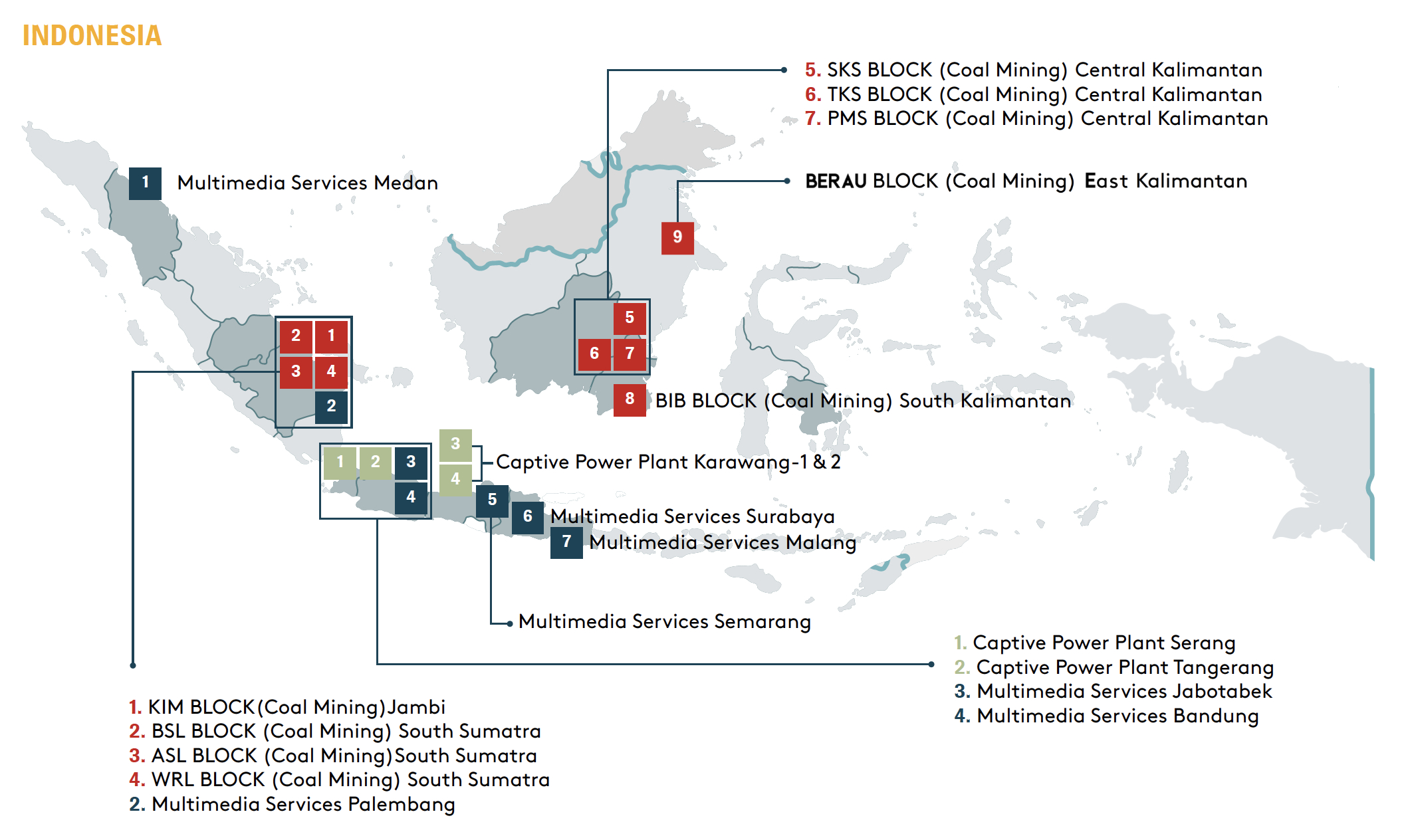
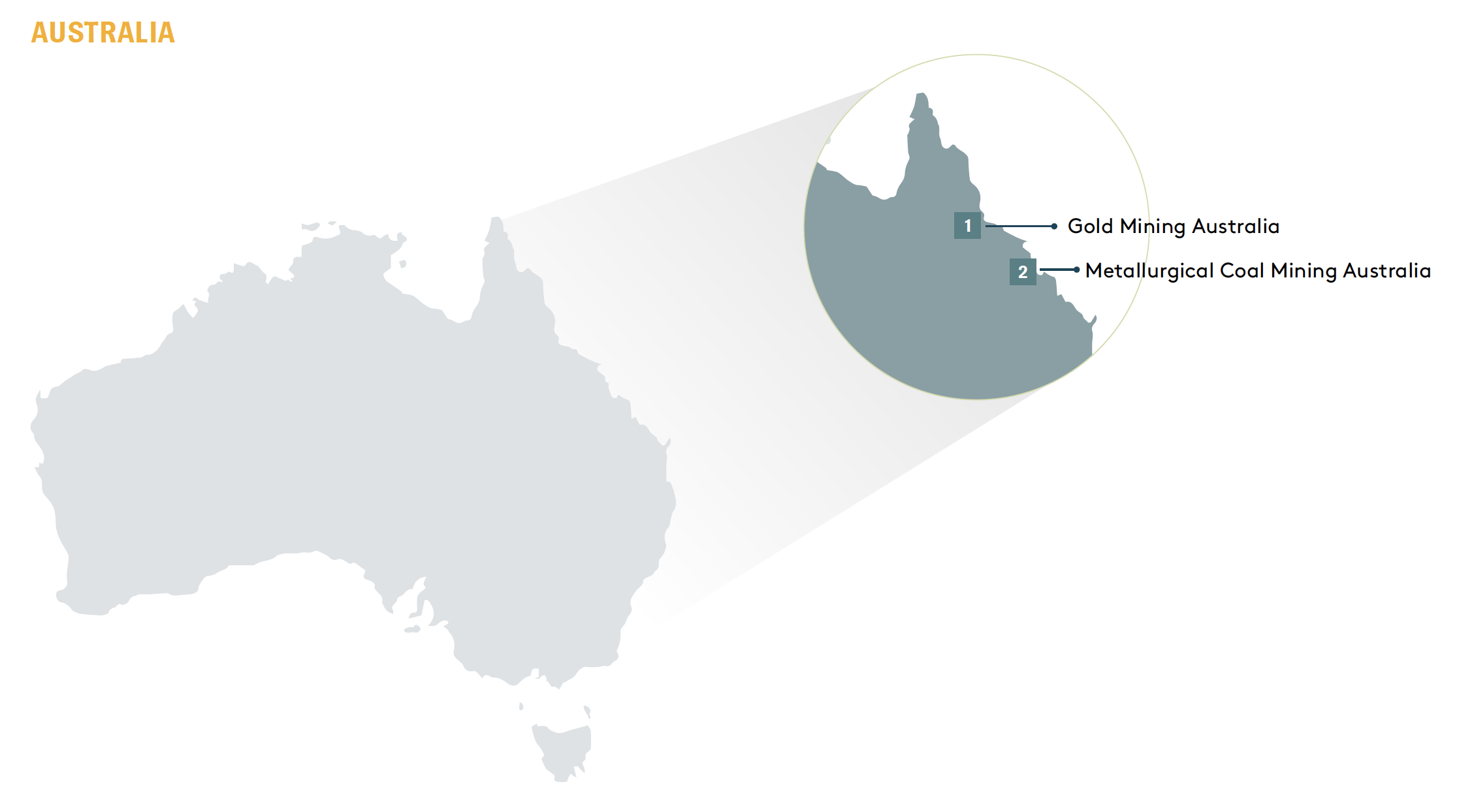
Fuganto Widjaja, born on Oct. 29, 1981, is a third-generation member of tycoon family Widjaja. His grandfather Eka Tjipta Widjaja, who died in January 2019, is the founder of the Sinar Mas Group business empire. His father Indra Widjaja is one of Eka’s sons from his marriage to Trini Dewi Lasuki, whom many believe to be his first wife.
Nobody knows for sure the exact number of Eka’s wives, children and grandchildren. At the end of the 1990s, it was estimated that he had at least eight wives and more than 40 children. At the end of 2019, 12 of Eka’s grandchildren were directly involved in the family business, although only 10 of them, including Fuganto, had the strongest control over the family business.
The Sinar Mas Group is divided into several main divisions. Four of Eka’s children – Teguh Ganda Widjaja, Indra, Muktar Widjaja and Franky Oesman Widjaja – handle different divisions, along with their sons and daughters. Teguh handles the paper and pulp business while Indra and Fuganto supervise the financial and mining businesses. Muktar controls the property business while Franky leads the agribusiness, telecommunications and energy sectors. “We believe in the adage ‘one captain for every ship,’” Teguh’s daughter, Linda Wijaya, once said.
Now, Fuganto leads the Sinar Mas Mining Group as its CEO. Within the group, there are Golden Energy and Resources Limited and PT DSSE Energi Mas Utama, two big holding companies for at least 39 companies, which have coal concessions or produce coals in Indonesia and Australia. In addition to these two, there is also PT Berau Coal Energy, whose subsidiary PT Berau Coal is the sixth biggest coal producer in Indonesia.
In total, the Sinar Mas Mining Group produced 60 million tons of coal in 2020. The group is the second biggest coal holding company in the archipelago.
Aside from serving as the Sinar Mas Mining Group CEO, Fuganto also holds an important position in several of the group’s companies. For one, he is the executive chairman of the Golden Energy and Resources Limited, president commissioner of PT Roundhill Capital Indonesia, as well as the commissioner of PT Golden Energy Mines and PT Borneo Indobara. He also served as the general director of PT Berau Coal Energy from August 2015 to June 2021.
“Coal will be for us what timber plantations are – a source of raw material for value added products,” said Fuganto in August 2015, not long after the Sinar Mas Group successfully acquired Asia Resource Minerals PLC, the owner of PT Berau Coal Energy.
Previously, Asia Resource Minerals PLC was known as Bumi PLC and owned by the Bakrie Group. The Bakrie family agreed to sell 23.8% of its shares there to the tycoon Samin Tan in July 2013. Afterward, in 2014 the Bakrie Group bought 29.2% of PT Bumi Resources’ shares. PT Bumi Resources is the biggest coal holding company in Indonesia which used to be owned by Asia Resource Minerals PLC. Since the share purchase, PT Bumi Resources has been officially “divorced” from the England-based company.
Indeed, the Sinar Mas Group has a special relationship with the Bakrie Group. Nirwan Bakrie, Aburizal Bakrie’s younger brother, is rumored to have close connections with Franky, one of Eka’s children. As per 2020, Franky has a 0.7% stake in PT Bumi Resources’s shares.
The Sinar Mas Group assigns some influential people in various strategic positions in a number of its companies. One of them is Gandi Sulistiyanto. He is a friend to Gibran Rakabuming Raka and Kaesang Pangarep, President Joko Widodo’s sons. He once served as the managing director of the Sinar Mas Group and the chief commissioner of PT Berau Coal Energy. Afterward, he was appointed Indonesian Ambassador to South Korea.
In addition to Gandi, there are also figures with military backgrounds. Suwandi, the executive director of PT Berau Coal Energy and PT Borneo Indobara, had a long career in the Army. His last rank was Major General. Meanwhile Marsetio, the deputy chief commissioner of PT Berau Coal Energy, used to be the Navy chief of staff for the 2012-2015 period with the last rank of admiral. Currently, Marsetio serves as defense and security advisor to Coordinating Minister for Maritime Affairs and Investment Luhut Binsar Pandjaitan.
On the commissioners board of PT Berau Coal Energy, there are former deputy attorney general Darmono and businessman Deswandhy Agusman, who has a close connection to Airlangga Hartarto, the Golkar party chairman and Coordinating Minister for Economic Affairs.
3. Sandiaga Uno
Coal holding company: PT Adaro Energy
Mining capacity: 54.53 million tons of coal in 2020
Concession size: 316,619 hectares across South, Central and East Kalimantan, as well as South Sumatra and Queensland, Australia
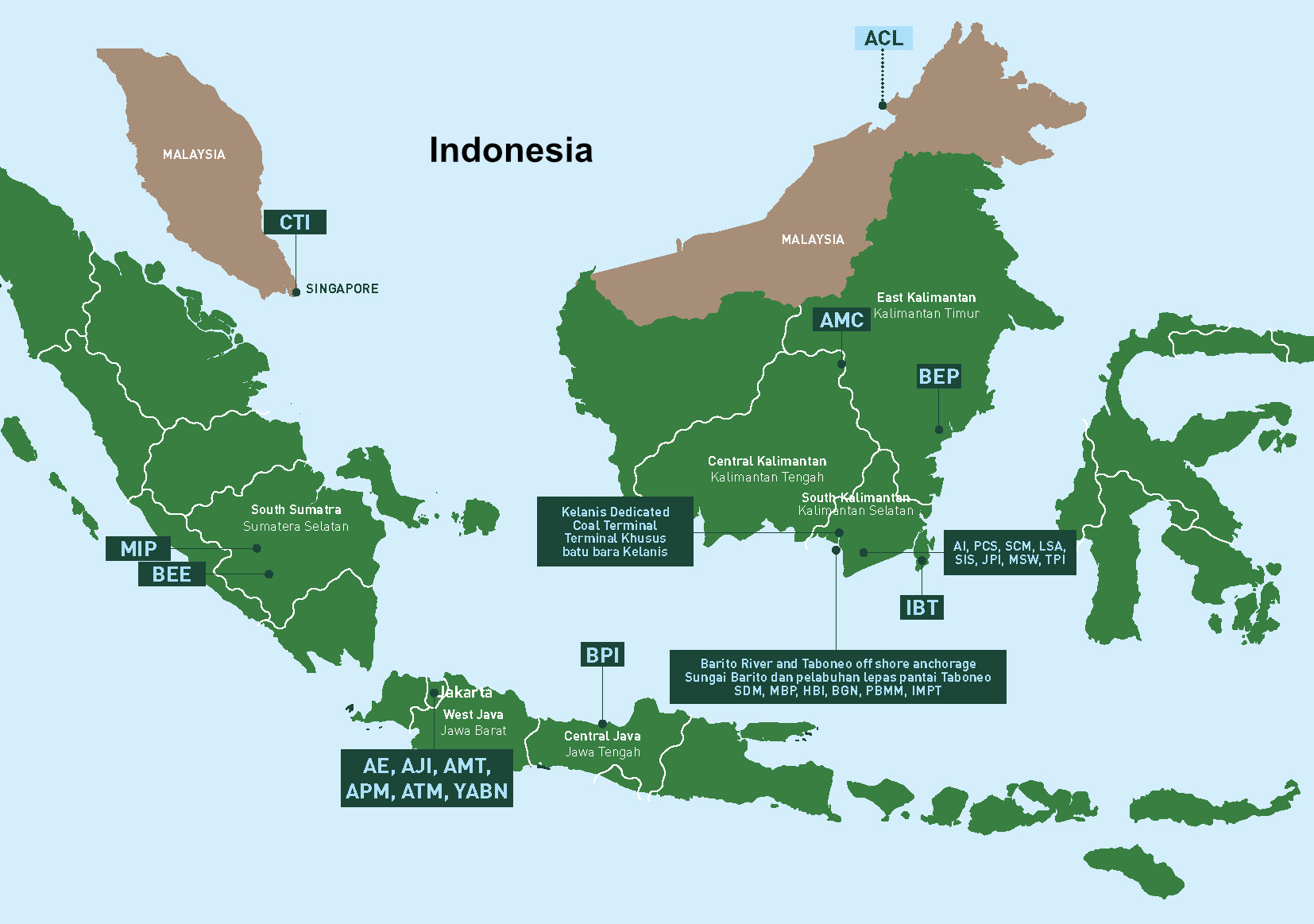
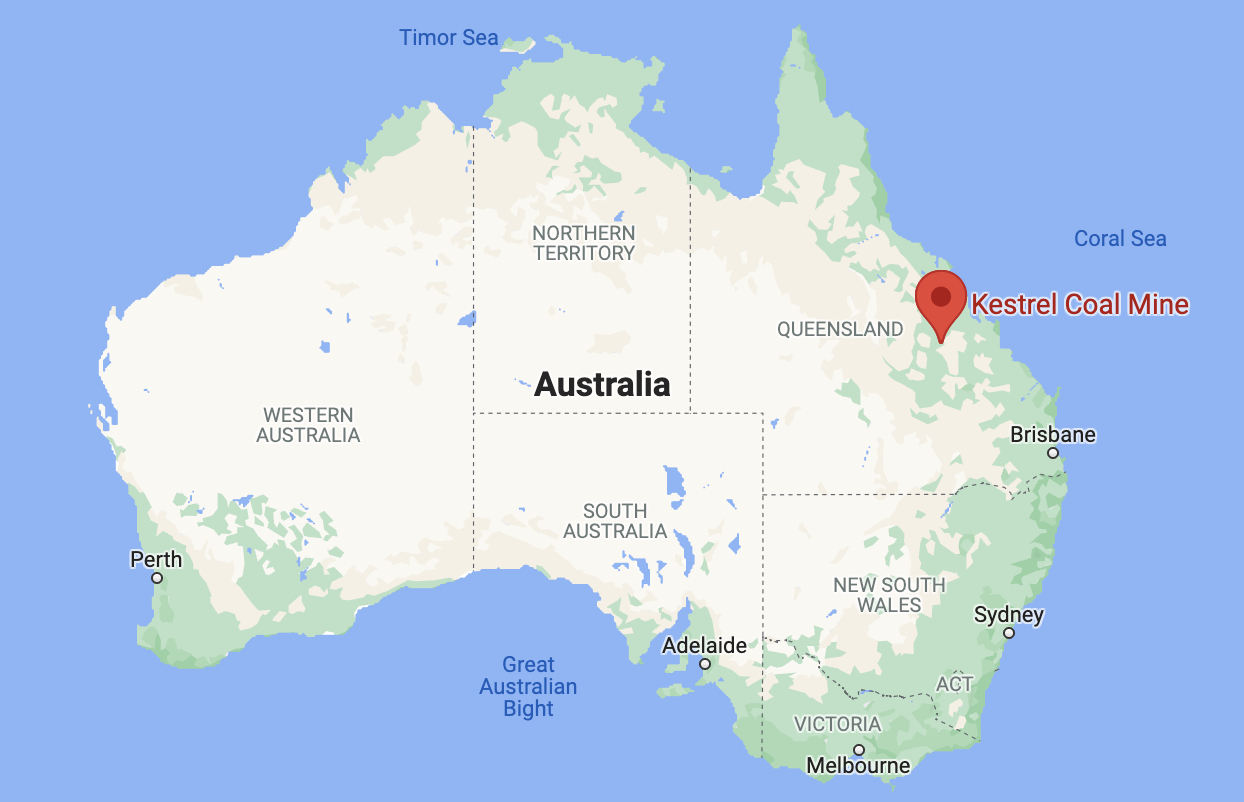
Sandiaga Salahudin Uno was born in Riau on June 28, 1969. His father Razif Halik Uno once worked for Caltex, a joint venture launched by two American oil companies: Texaco and Chevron (they merged in 2001). His mother Rachmini Rahman or better known as Mien Uno, is a successful businesswoman who made it into Globe Asia magazine’s 2007 list of 99 most influential women in Indonesia.
In 1990, Sandi, as he is familiarly called, obtained an undergraduate degree in business from Wichita State University in the US. He then worked for a year in Bank Summa, owned by tycoon William Soeryadjaya’s family, while also being mentored by the founder of the conglomerate Astra Group. He also received a master’s degree in 1991, on scholarship, for the same major at George Washington University and graduated two years afterward. Then he worked abroad in several Singaporean and Canadian companies.
Sandi lived a privileged life, but 1997 changed everything. A financial crisis hit the world and gave his employers no choice but to cease operations. Sandi returned to Indonesia empty-handed then started the financial company PT Recapital Advisors with Rosan Roeslani, his best friend since they both attended Pangudi Luhur Senior High.
In 1998, Sandi was asked by Edwin Soeryadjaya, one of William’s sons, to help him seal an investment deal with a foreign company in Indonesia. The transaction was completed smoothly, paving the way for Sandi to join Edwin’s business full-time, helping him develop the investment company PT Saratoga Investama Sedaya. The company had been established since 1991, but wasn’t active until seven years later.
Sandi’s business grew rapidly. In 2002, Saratoga started to invest in the Adaro Group, which is currently led by Garibaldi “Boy” Thohir, the older brother of State-Owned Enterprises Minister Erick Thohir. As of 2020, Saratoga owned 58.46% of PT Adaro Energy – Adaro Group’s coal holding company – comprising direct and indirect ownership. In the same year, Adaro Energy also became the third largest coal holding company in Indonesia, with an annual production of 54.53 million tons, from its mines in both Indonesia and Australia.
Sandi also once served as the executive director of Saratoga and director of Adaro Energy. But, he resigned from both positions not long after he joined the Grand Indonesia Movement Party (Gerindra) led by Prabowo Subianto in April 2015. According to 2020 data, Sandi still owned 21.51% of Saratoga’s direct shares. His older brother, Indra Cahya Uno, served as a commissioner there. Meanwhile, his longtime partner Edwin owned 65.82% of the company’s direct and indirect shares while serving as Saratoga’s president commissioner. At the same time, Edwin also served as Adaro Energy’s president commissioner.
On the other hand, Recapital acquired coal company PT Berau Coal Energy (BCE) on Dec. 30, 2009. After 12 days, BCE’s subsidiary PT Berau Coal (BC) formed a partnership with Velodrome Worldwide, based in Seychelles, a tax haven island nation in the Indian Ocean. BC agreed to pay US$2 million per month for the business and operational consultancy services provided by Velodrome, without any detailed explanation regarding the provided services. In total, BC paid US$48 million within the 2011-2012 period, before eventually deciding to terminate the partnership.
According to a Panama Papers investigation released by the International Consortium of Investigative Journalism in 2016, Sandi was Velodrome’s sole shareholder and director between October 2007 and May 2009. Afterward, Sandi’s position was replaced by Ng Soon Kai, a lawyer from Singapore who is still connected with Sandi.
Sandi also served as BC’s commissioners board member from March 2010 to June 2013. Meanwhile, his close friend Rosan served as BC’s executive director from August 2010 to March 2013. Therefore, the two of them had total control over BC when that company paid millions of US dollars to Velodrome. For what kind of service, nobody knows exactly. It has been alleged that Sandi has benefited from all those payments personally in some way.
In December 2011, the majority of BCE’s shares was taken over by Bumi PLC, which at that time was collectively owned by the Bakrie family, tycoon Samin Tan, prominent British businessman Nathaniel Rothschild, as well as Recapital. Bumi PLC subsequently changed its name to Asia Resource Minerals PLC in December 2013 before it was acquired by the Sinar Mas Group in August 2015.
Sandi became a household name when he and Anies Baswedan were running for office in the 2017 Jakarta gubernatorial election. They won. Yet, after serving as Jakarta deputy governor for only a year, Sandi resigned from his position to become Prabowo’s running mate in the 2019 presidential election. The two lost, but each got a slot in the cabinet. Prabowo has become Defense Minister since the end of 2019, while Sandi has served as the Tourism and Creative Economy Minister since the end of 2020.
Currently, Sandi also serves as the board of advisors’ deputy chairman for the Gerindra Party, which Prabowo still leads. Just like Sandi, Prabowo has his own coal business, via the Nusantara Group.
4. Edwin Soeryadjaya
Coal holding company: PT Adaro Energy
Mining capacity: 54.53 million tons of coal in 2020
Concession size: 316,619 hectares in South, Central and East Kalimantan, as well as South Sumatra and Queensland, Australia
Edwin Soeryadjaya was born in Jakarta on July 17, 1949, the offspring of William Soeryadjaya and Lili Anwar. His father William, is a tycoon who in 1957 established the Astra Group, with PT Astra International as its holding company.
Edwin joined Astra in 1978. He developed his career there until eventually he was trusted to serve as the company’s deputy executive director. Yet, he was forced to resign from the position in 1993, when his family lost control over Astra after a long story involving Edward Soeryadjaya, Edwin’s older brother (William’s eldest child).
Edward resigned from his position as the director of PT Astra Graphia, one of Astra’s subsidiaries, before he established Summa International Ltd. in 1979. He acquired Bank Agung Asia in 1988, then changed the company’s name into Bank Summa. He aggressively spent trillions of rupiahs to expand Summa Group’s business. Poor governance caused Bank Summa to be entangled in a Rp 1.2 trillion non-performing loan and Rp 500 billion of debt.he bank went into bankruptcy, forcing it to be liquidated in December 1992.
William came to his son’s rescue by taking over Bank Summa’s ownership, using his share ownership in Astra as a collateral, before ultimately selling 100 million of Astra’s 242 million stock options at an affordable price to help settle Bank Summa’s responsibilities to its customers. Astra signed the debt restructuring deal in 1999. Afterward, investment company Jardine Cycle & Carriage Ltd. gradually took over Astra’s business starting in 2000.
During the difficult period, Edwin met Sandiaga Uno, who was also going through some financial troubles after the company which he worked for in Canada collapsed. In 1998, they agreed to develop Edwin’s investment company PT Saratoga Investama Sedaya. Their business saw significant growth.
In 2002, Saratoga started to invest in the Adaro Group, which Garibaldi “Boy” Thohir currently leads. Boy is the older brother of State-Owned Enterprises Minister Erick Thohir. As of 2020, Saratoga’s ownership of PT Adaro Energy – Adaro Group’s coal business holding company – was reported to account for 58.46% of the company, both directly and indirectly. In the same year, Adaro Energy had become the third biggest coal holding company in Indonesia, with an annual production of 54.53 million tons from its coal mines in Indonesia and Australia.
As of 2020, Edwin owns 65.82% of direct and indirect shares and serves as the president commissioner of Saratoga, which controls Adaro Energy. Edwin also has a 3.29% direct ownership interest in Adaro Energy, in addition to serving as the company’s chief commissioner.
With this, it is as if Adaro Energy has become Astra’s unofficial subsidiary. This company is controlled by former Astra bigwigs or those affiliated with the Soeryadjaya family. Sandi, which still had 21.51% ownership of direct shares in Saratoga, per 2020 data, is William’s protege. Sandi was mentored directly by William while the former was working for Bank Summa in the early 1990s. Meanwhile, Joyce Soeryadjaya Kerr, Edwin’s younger sister, is also Saratoga’s commissioner. Meanwhile, Michael William Soeryadjaya, Edwin’s son, now serves as Saratoga’s executive director.
Boy, who owns 6.18% of Adaro Energy’s direct shares and serves as its executive director, is the son of Teddy Thohir, who earned his experience through his years working for Astra and serving as its director at one point.
Theodore Permadi Rachmat, William’s nephew and Edwin’s cousin, currently owns 2.54% of Adaro Energy’s direct shares, while serving as the company’s deputy chief commissioner. Theodore’s son Christian Ariano Rachmat, meanwhile, is Adaro Energy’s deputy executive director. Arini Subianto, who owns 0.25% of direct shares of Adaro Energy and serves as one of the company’s commissioners, is the daughter of Benny Subianto, also formerly an Astra executive.
It is not that Adaro Energy is problem-free. This company has been suspected of using its subsidiaries in Singapore and Mauritius to move profits offshore to avoid paying taxes in Indonesia. As a consequence, Indonesia is estimated to have lost tax income of US$125 million during the 2009-2017 period. In 2019, Boy denied any wrongdoing, claiming the company was “transparent.”
5. Garibaldi “Boy” Thohir
Coal holding company: PT Adaro Energy
Mining capacity: 54.53 million tons of coal in 2020
Concession size: 316,619 hectares across South, Central and East Kalimantan, as well as South Sumatra, Indonesia and Queensland, Australia
Garibaldi “Boy” Thohir was born in Jakarta on May 1, 1965. He was the second child of Teddy Thohir and Edna Thohir. His older sister Hireka Vitaya, familiarly called Rika, is the founder of interior design company Interni Asia. His younger brother Erick Thohir, meanwhile, is the founder of the Mahaka Group, which focuses on media and entertainment business.
Teddy once worked for Union Carbide, a chemical company in the US. He then resigned from his position in the company after Like Rani Imanto offered him to join PT Astra International, a company established by William Soeryadjaya in 1957. The offer was thanks to the close connections between Edna and Like. Like herself, she is the wife of Theodore Permadi Rachmat, who is William’s cousin.
Teddy successfully climbed the corporate ladder until he eventually secured strategic positions as Astra’s director and shareholder. Afterward, Teddy established his own company called PT Trinugraha Thohir, which currently handles several industrial sectors, including property, automotive and telecommunications.
The close connections between the Thohir and Soeryadjaya families eventually impacted Boy’s career. In early 1990s, upon finishing his master’s degree studies in the US, Boy ventured into property business. He once planned to build an apartment in the Casablanca area in Jakarta. Mid-project, however, its land acquisition and clearance expenses went sky-high. Boy could not afford to pay for its completion. After discussing the matter with his father, Boy decided to go ahead with his plan to buy land there anyway and immediately resold the purchase to Astra, which at that time also wanted to develop a property business.
In 1992, Boy partnered with an Australian businessman and for the first time got into the coal business with PT Allied Indo Coal as his vehicle. They dredged coal in Sawahlunto, West Sumatra. After five years, his Australian business partner ran away. Residents whose lands were confiscated to build the mining area filed a lawsuit against the company, demanding compensation, which Boy was eventually forced to pay.
Such a bitter experience did not seem to deter Boy’s ambition in the coal business at all. After that, Boy partnered with Theodore, William’s nephew who once also served as Astra’s CEO, and went on with his coal ventures in South Kalimantan in early the 2000s through PT Padangbara Sukses Makmur. This company is part of the Triputra Group, which Theodore founded in 1998. In addition to this, Boy also joined forces with businessman Abdussaman Sulaiman, the founder of the Hasnur Group, to mine coal in South Kalimantan through PT Bhumi Rantau Energi.
Afterward, Padangbara worked together with PT Adaro Indonesia to mix the coals and adjust the quality of the products they were selling. This joint venture only happened after 2002, when PT Saratoga Investama Sedaya took over 40% of Adaro Indonesia’s shares from PT Asminco Bara Utama, which was controlled by tycoon Sukanto Tanoto. Saratoga’s founders are Edwin Soeryadjaya, the son of William the founder of Astra Group along with Sandiaga Uno, who used to be William’s protege and is close to the Soeryadjaya family.
Afterward, Boy initiated the reunion of some Astra key people. He approached Theodore, Edwin, Sandi, and Benny Soebianto, who is a former Astra executive. They then formed a consortium, which in 2005 acquired 40.8% of Adaro Indonesia’s other shares from New Hope, a coal company based in Australia. PT Padang Karunia, owned by Boy and Theodore, was subsequently renamed PT Adaro Energy and turned into Adaro Indonesia’s holding company. In 2008, Adaro Energy listed its stocks in the Indonesian Stock Market. As of 2020, Adaro Energy is Indonesia’s third biggest coal holding company, with an annual production of 54.53 million tons from its mines in Indonesia and Australia.
It is not that Adaro Energy is problem-free. This company has been suspected of using its subsidiaries in Singapore and Mauritius to move their profits offshore, to avoid paying taxes in Indonesia. As a consequence, Indonesia has been estimated to lose a tax income of US$125 million during the 2009-2017 period. In 2019, Boy denied any wrongdoing, claiming the company was “transparent”.
Boy currently serves as Adaro Energy’s executive director. As per 2020, he has some 6.18% direct shares in the company. He is also the biggest shareholder in PT Adaro Strategic Investment, which controls 43.91% of Adaro Energy’s shares. In addition to all of this, Boy also serves as the president commissioner of Bhumi Rantau Energi, owned by the Hasnur Group, as well as the independent commissioner of PT Aplikasi Karya Anak Bangsa, aka Gojek, which was established by Education, Culture, Research and Technology Minister Nadiem Makarim.
Boy’s younger brother Erick, meanwhile, is the State-Owned Enterprises Minister who controls the Mining Industry Indonesia (MIND ID), a coal holding company for several government-owned mining companies. The main coal miner under the MIND ID umbrella is PT Bukit Asam. State-owned mining enterprises like PT Timah and PT Aneka Tambang also own several coal businesses, although these are relatively small-scale. MIND ID’s total coal production amounted to 25.15 million tons in 2020.
Boy has been successful in building important networks, not only among fellow business magnates but also within the governmental elite. He is close to AM Hendropriyono, the former State Intelligence Agency head who is close to the Indonesian Democratic Party of Struggle (PDIP) chairwoman Megawati Soekarnoputri. Hendropriyono himself once served as the chief commissioner of PT Merdeka Copper Gold, which is also owned by Saratoga and Boy.
Boy has also formed a relationship with President Joko Widodo since the latter was still serving as the mayor of Surakarta, Central Java in 2011, as cited by Rhenald Kasali in his book Self Disruption (2018).
When Jokowi served as Jakarta governor in 2012, Boy once shared a story about his business relationship with Jokowi. One of his business concerns he shared to Jokowi was the progress of the construction of a steam power plant in Batang, Central Java. That project was carried out by PT Bhimasena Power Indonesia, a consortium entity initiated by PT Adaro Power (Adaro Energy’s subsidiary) along with two Japanese companies: Electric Power Development Co. (better known as J-Power) and Itochu Corporation. This project was stalled due to land clearance issues.
A few months after Jokowi was sworn in as president in October 2014, Boy was invited to the State Palace. Once again, he raised his concerns about the Batang steam power plant project. Afterward, he became a regular guest to the palace, whether alone or accompanied by his investor partners from Japan. Within a year, in 2015 the land clearance was completed.
6. Erick Thohir
Coal holding company: Mining Industry Indonesia (MIND ID)
Mining capacity: 25.15 million tons of coal in 2020
Concession size: 109,985 hectares in South and West Sumatra, Riau, Jambi, as well as East and South Kalimantan in Indonesia
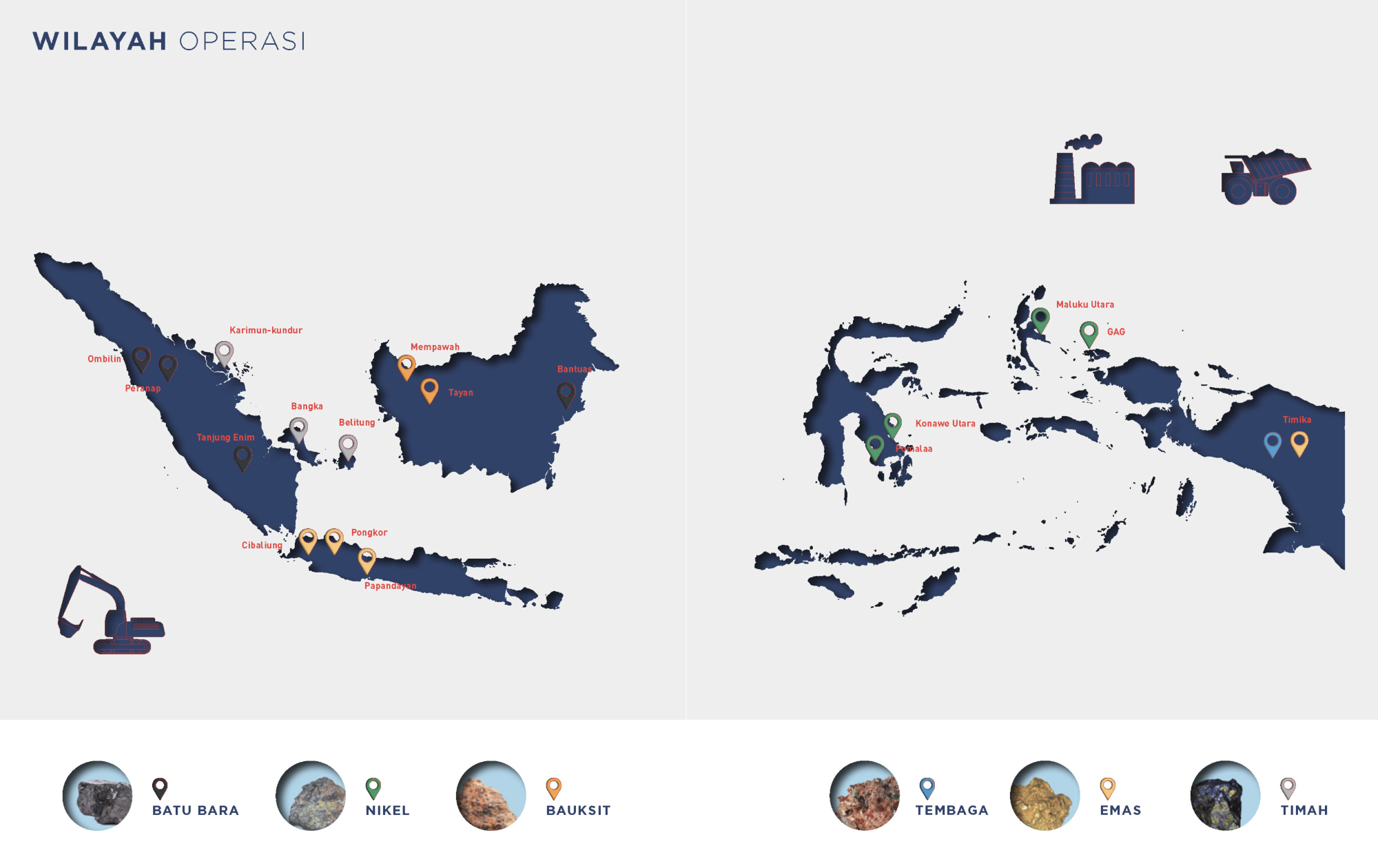
Erick Thohir was born in Jakarta on May 30, 1970. He’s the third child of Teddy Thohir and Edna Thohir, following the eldest, Hireka Vitaya (familiarly called Rika), the founder of the interior design company Interni Asia, and the second eldest, Garibaldi “Boy” Thohir, the boss of coal company PT Adaro Energy.
Teddy, Erick’s father, is a first-generation employee of PT Astra International, a company founded by tycoon William Soeryadjaya in 1957. There, Teddy successfully climbed the corporate ladder and he eventually assumed the positions of company director and shareholder. Teddy also founded the family enterprise PT Trinugraha Thohir, which now runs its business in several sectors, including property, automotive, and telecommunications.
In 1993, Erick obtained a master’s degree in business in the US. A year later, upon his return to Indonesia, he founded the Mahaka Group together with three of his friends who, like him, went to study in the US: Muhammad Lutfi, Wishnu Wardhana, and Harry Zulnardy. Lutfi, who currently serves as Trade Minister, was then assigned to serve as the Mahaka Group’s CEO.
In the beginning, the Mahaka Group operated in the industry of limestone, the material required to produce calcium oxide. Its subsidiary, PT Mahaka Industri Perdana (MIP), worked together with gold and copper mining company PT Freeport Indonesia for the latter’s calcium oxide factory maintenance and operations in Grasberg mining area in Mimika, Papua.
Currently, MIP has been taken over by coal company PT Indika Energy. A portion of PT Indika Energy’s shares is owned by the family of tycoon Wiwoho Basuki Tjokronegoro, Wishnu’s father-in-law.
As time went by, Mahaka Group’s business kept expanding to also include the sports and entertainment sector. In 2001, the group acquired PT Abdi Bangsa, who owned the daily newspaper Republika which at that time was financially ailing. Erick was then appointed president director of Abdi Bangsa, which subsequently was renamed PT Mahaka Media in 2010. That company now controls several media outlets. Apart from Republika, there is also Harian Indonesia (both are newspapers), Golf Digest Indonesia magazine, Jak TV television station, as well as radio stations Prambors and Gen FM.
Making use of his father’s connections, Erick was once mentored by Jakob Oetama, the founder of prominent national newspaper Kompas, as well as Dahlan Iskan, the former boss of the Jawa Pos newspaper. The two taught him how to run a media business.
In 2007, Erick worked alongside Anindya Novyan Bakrie and Rosan Roeslani to acquire the Lativi television station, which subsequently changed its name into tvOne. Anindya is the eldest son of Aburizal Bakrie and is the successor to the family business, which at that time also owned the ANTV television station. Meanwhile, Rosan is a part of the Bakrie family inner circle. Currently, he serves as the president commissioner of coal miner PT Bumi Resources.
At present, television stations tvOne and ANTV, as well as online media VIVA.co.id, are managed under PT Visi Media Asia, itself controlled by the Bakrie family. Erick once served as president director of tvOne and ANTV, as well as the president commissioner of Visi Media Asia.
Erick’s love of basketball led him to take over local club Satria Muda in 1998 and buy shares in the American club Philadelphia 76ers in 2011. He also once served as the executive chairman of the Indonesian National Basketball Association for the 2006-2010 period, as well as the president of the Southeast Asia Basketball Association for the 2006-2014 period.
Outside of basketball, Erick also tried his luck in soccer. He was once a shareholder in local soccer clubs the Persib Bandung (West Java) and Persis Solo (Central Java), American club DC United, as well as Italian club Inter Milan. Erick and Anindya are currently in the process of acquiring a majority of shares in British club Oxford United.
Clearly, Erick is a media tycoon and sports group investor, and after he successfully accomplished his duties as the committee chairman of the 2018 Asian Games, his name was catapulted into fame. That experience served as momentum to launch his career in politics.
Erick has been appointed State-Owned Enterprises Minister for the 2019-2024. With his new position, he currently oversees the management of all state-owned enterprises and is able to plant people he trusts in leadership positions by reshuffling the various boards of directors. He also has an influence over the Mining Industry Indonesia (MIND ID), a holding company for several government-owned mining companies. PT Bukit Asam is the main coal miner in MIND ID. In addition, PT Timah and PT Aneka Tambang also have several relatively small-scale coal businesses. MIND ID’s total coal production amounted to 25.15 million tons in 2020.
In December 2021, for instance, Erick reshuffled the leadership of MIND ID and PT Timah. Hendi Prio Santoso replaced Orias Petrus Moedak as MIND ID president director. Furthermore, Achmad Ardianto was appointed Timah president director, replacing M. Riza Pahlevi Tabrani.
After he became a minister, Erick resigned from his positions in several corporations. Still, he retained his expansive corporate network, which reaches into the coal business. Anindya, his old friend, now controls Bumi Resources. Boy, his older brother, now leads Adaro Energy. Meanwhile, Wishnu and Arsjad Rasyid, two peers he studied with in the US, control Indika Energy. In 2020, these three companies were the first, third, and fourth biggest coal holding companies in Indonesia, respectively.
7. Agus Lasmono
Coal holding company: PT Indika Energy
Mining capacity: 34.3 million tons of coal in 2020
Concession size: 76,120 hectares in East and Central Kalimantan, Indonesia
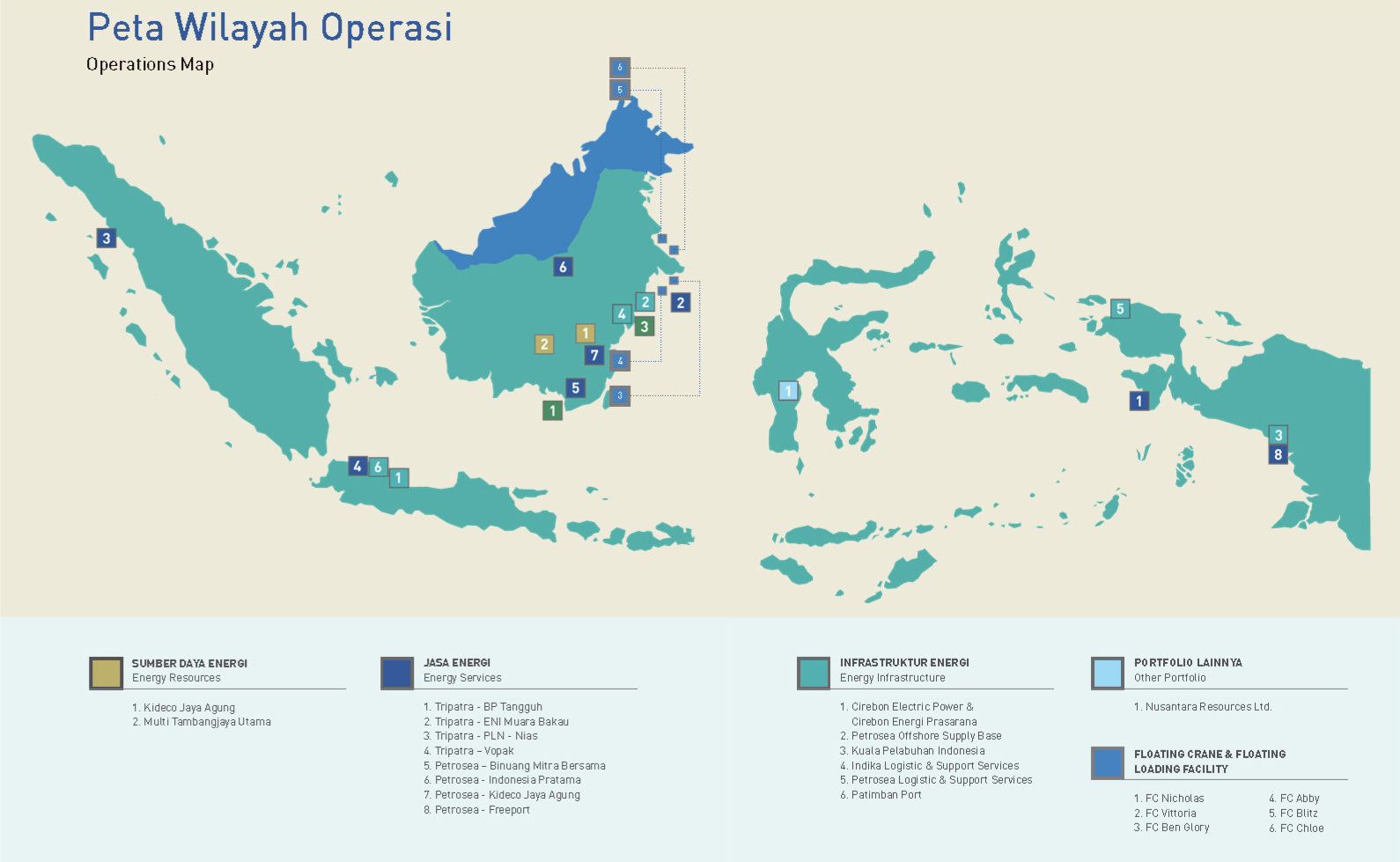
Agus Lasmono was born in Jakarta, April 6, 1972. He was the youngest child of Sudwikatmono, nicknamed “Dwi,” and Sri Sulastri. Dwi is the younger cousin of Soeharto, the former authoritarian president who led Indonesia from 1966 to 1998. During the New Order era, he and other Soeharto cronies successfully built a giant business empire.
In 1967, Bank Central Asia (BCA) founder Liem Sioe Liong came to Soeharto and asked for his recommendation of a “pribumi” (non-Chinese Indonesian) whom he could hire as a business partner. This move was important in allowing Liem to get big loans from local lenders, something which he found very difficult to achieve at that time because back then he still had a foreigner status. Soeharto proposed Dwi’s name. Liem agreed.
Together with Dwi, Djuhar Sutanto and Ibrahim Risjad, Liem built his business giant. This business group was later dubbed the “Gang of Four.” Their business covered a diverse range of sectors. In 1969, for instance, they launched PT Boga Sari (now PT Bogasari Flour Mills), which secured monopoly rights to distribute flour from the Logistics Affairs Body (Bulog). They also expanded the business of export-import company PT Waringin Kencana, cement producer PT Distinct Indonesia Cement Enterprise (what would later become Indocement Group) and snack company PT Panganjaya Intikusuma (what would later become Indofood Group). Dwi played an important role in bridging the interests of Gang of Four with those of the government, including easing permit issuances.
Apart from this, Dwi also developed other business networks with several different partners. Together with brothers Benny Suherman and Bambang Sutrisno, Dwi once controlled the entire imported film distribution channels in Indonesia during the New Order era via PT Suptan Film. Dwi and Benny built the Subentra Group which covered a diverse range of sectors, including a cineplex chain (21 or, now, XXI) and in the banking industry through Bank Subentra. Dwi and Bambang also developed the Golden Truly convenience store network as well as Bank Surya.
With Henry Pribadi, the tycoon who founded the Napan Group, Dwi also founded the SCTV television station in 1989. Halimah Agustina Kamil, the wife of Soeharto’s son Bambang Trihatmodjo, along with two other businesspeople who were close with the Cendana family, Azis Mochtar and Peter Gontha, were once SCTV shareholders.
The 1997-1998 financial crisis hit Dwi’s business hard. Bank Subentra and Bank Surya both went bankrupt. He also had to let go of his ownership of the 21 cineplex chain, and handed it over to Benny and Harris Lasmana, his other business partners. Some of Dwi’s companies were merged into the Indika Group founded by Agus, his son, along with Arsjad Rasjid in 1995. Agus and Arsjad had been friends since the two of them studied at Pepperdine University in the US. Afterward, Agus led his family business revival under the Indika Group flag.
In the beginning, the Indika Group worked in the multimedia and information sector. The company ventured into coal business after PT Indika Energy took over PT Kideco Jaya Agung in 2004. Indika Energy was founded in 2000 by Agus, Arsjad and Wishnu Wardhana, a fellow Pepperdine graduate.
In 2012, Indika Energy acquired two other coal mining firms: PT Multi Tambangjaya Utama and PT Mitra Energi Agung. Indika Energy’s total coal production amounted to 34.3 million tons in 2020, making it the fourth largest coal holding company in Indonesia.
Not only does it dredge coal, but Indika Energy also involves itself in the power plant and mining services businesses. PT Mahaka Industri Perdana (MIP), one of its subsidiaries, worked together with gold and copper mine PT Freeport Indonesia for the operations and maintenance of a calcium oxide factory in the Grasberg mining area in Mimika, Papua. MIP was previously owned by the Mahaka Group, founded by Wishnu with his three best friends: Erick Thohir, Muhammad Lutfi and Harry Zulnardy. Erick, who currently sits as the State-Owned Enterprise Minister, has been friends with Arsjad since they studied in the United States.
As per 2020, Indika Energy was controlled by two tycoon families. Through PT Indika Inti Investindo, Agus controlled 37.79% of Indika Energy’s shares. Meanwhile, through PT Teladan Resources, the family of tycoon Wiwoho Basuki Tjokronegoro held 30.65% of the shares. Wiwoho is Wishnu’s father-in-law. Wishnu once served as the campaign manager for Agus Harimurti Yudhoyono and Sylviana Murni when the two were running for office during the Jakarta gubernatorial election in 2017.
Now, Agus serves as the president commissioner of Indika Energy and Net TV, a television station which he started in 2013 with Wishnutama Kusubandio, the former Tourism and Creative Economy minister. Arsjad, his friend, serves as the executive director and represents Agus’ family in Indika Energy. Recently, Arsjad was also appointed chairman of the Indonesian Chamber of Commerce and Industry (Kadin) for the 2021-2026 period.
Tri Hanurita, Agus’ older sister, is a Golkar party politician who once served as a member of House of Representatives’ Commission VII overseeing energy and mineral resources affairs. Tri’s husband is Maj. Gen. (ret.) Dessano Indrasakti, the economics expert staff member of Defense Minister Prabowo Subianto, who also runs his own coal business.
8. Low Tuck Kwong
Coal holding company: PT Bayan Resources
Mining capacity: 30.2 million tons of coal in 2020
Concession size: 126,293 hectares in East and South Kalimantan in Indonesia
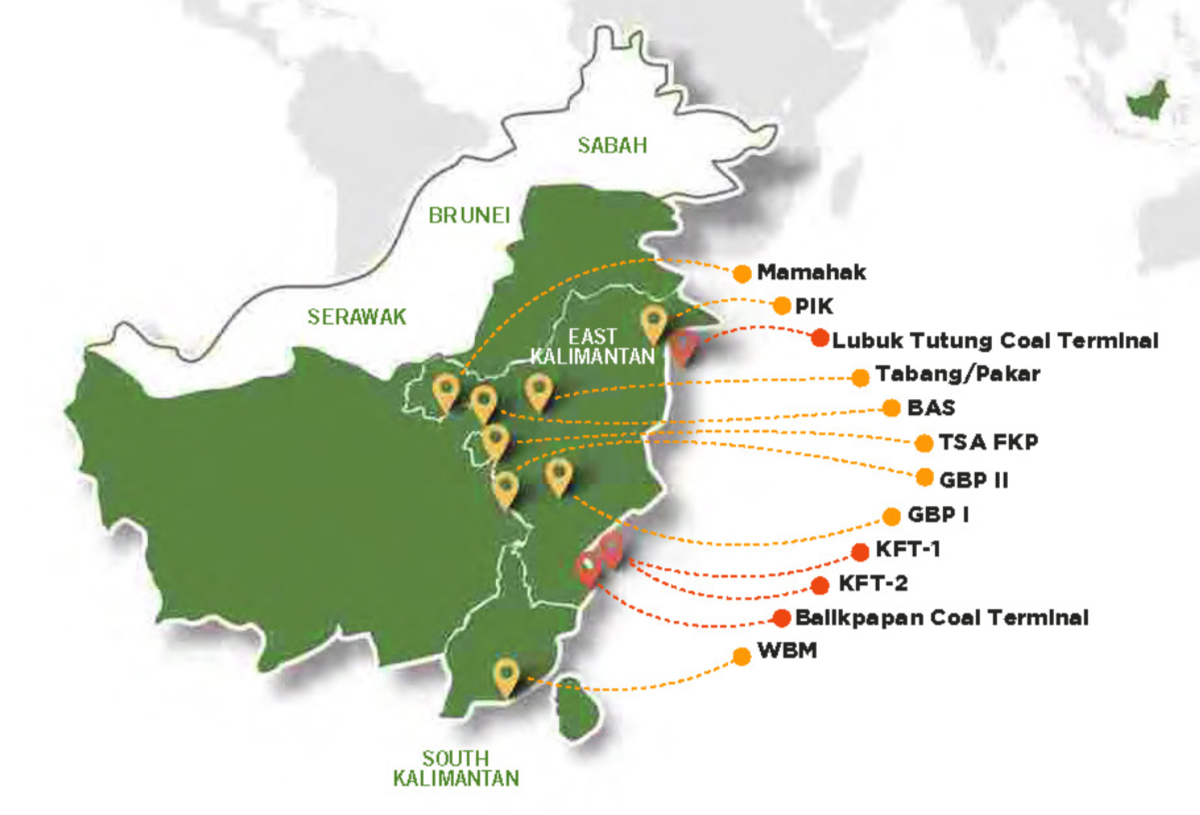
Low Tuck Kwong was born in Singapore on April 17, 1948. He grew up there and once worked for his father’s construction company, before migrating to Indonesia at the age of 24. His business journey in Indonesia started in 1973, when he founded PT Jaya Sumpiles Indonesia (JSI), a land development and civil construction contractor. Low ventured into the coal business in 1988, when JSI got contracted to mine coal for the first time.
A turning point in Low’s career happened in 1998, or six years after he officially became an Indonesian citizen. That year, he officially acquired PT Gunungbayan Pratamacoal, which controls a coal concession spanning thousands of hectares in East Kalimantan, and PT Dermaga Perkasapratama, a coal terminal operator in the same province.
After that, Low took over the ownership of several coal companies, including when he bought 5% of PT Kideco Jaya Agung’s shares from Samtan, a South Korean company which changed its name to ST International in the early 2000s.
In 2004, Low founded PT Bayan Resources, which then became the holding company for several of Bayan Group’s companies. In 2017, Low sold his 5% shares in Kideco to PT Indika Energy, a coal company controlled by businessman Agus Lasmono (a relative of former President Soeharto) together with the family of tycoon Wiwoho Basuki Tjokronegoro.
Nonetheless, Low’s coal business continued to grow rapidly. According to 2020 information, Bayan’s total coal production reached 30.2 million tons, making it the fifth biggest coal holding company in Indonesia. Currently, Low owns 55.2% of Bayan’s shares while serving as the executive director of Bayan Resources.
Low also still retains his connections to Kideco through a mining service company PT Samindo Resources. Kideco is Samindo’s biggest client. Samindo has been contracted to manage Kideco’s coal mines in East Kalimantan. Low has 14.18% shares in Samindo. Meanwhile, ST International, which still owns 9% of Kideco’s shares, controls 59.03% of Samindo’s shares.
It’s not that Low’s business career has been free of obstacles. He faced his own share of lawsuits. Haji Asri, the former owner of Gunungbayan, filed a lawsuit against Low and Bayan Resources in 2008; he contended thatthe acquisition process in 1998 happened under significant pressure. Low was also alleged to have not completed the entire payment for the acquisition. But, the judge found Low not guilty.
Apart from this, tycoon Sukamto Sia once also filed a lawsuit against Low in July 2008, a month before Bayan Resources listed its stock on the Indonesian Stock Exchange. According to Sukamto, Low once promised to grant50% shares in Bayan Resources to Sukamto in exchange for a loan provided to Low to start his coal business in the mid-1990s. The case was taken to the Singaporean High Court, which later rejected Sukamto’s lawsuit in 2012 and even obliged Sukamto to pay 132.3 million Singaporean dollars (US$98 million) in damages to Low in 2015 because he was deemed to have defamed Low, just before Bayan Resources was listed in the stock market.
In 2011, the Australian company White Energy also filed a lawsuit against Bayan Resources because they arguedLow’s company violated payment and coal supply obligations related to joint venture PT Kaltim Supacoal. The case is still awaiting conclusion.
9. Prabowo Subianto
Coal business group: Nusantara Group
Mining capacity: Unknown
Concession size: At least 62,753 hectares in East Kalimantan, Indonesia
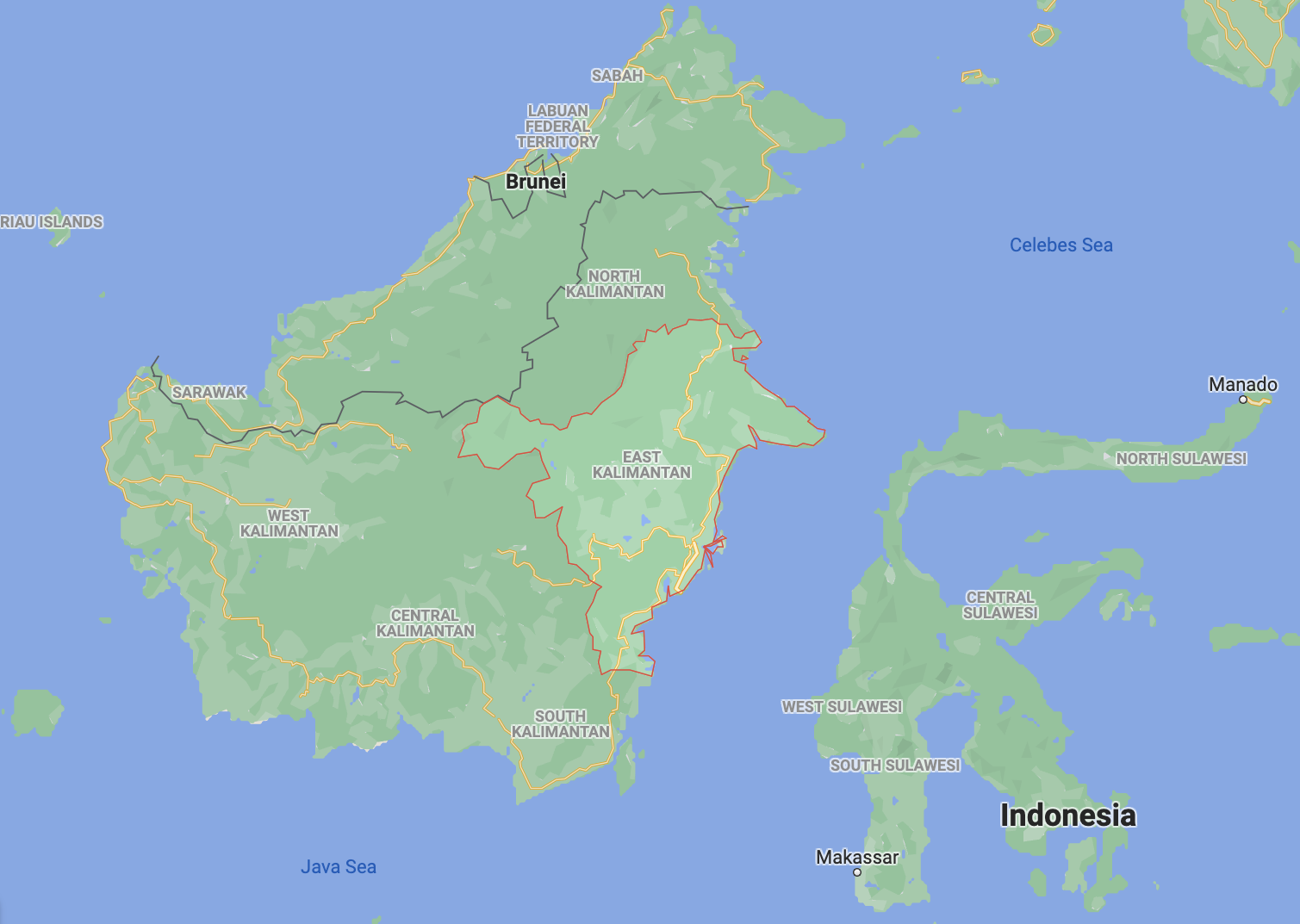
Prabowo Subianto Djojohadikusumo was born in Jakarta on Oct. 17, 1951. He was the third of four siblings of the couple Soemitro Djojohadikusumo and Dora Marie Sigar.
Soemitro, Prabowo’s father, is a famous economist who once served as the Industry and Trade, as well as Finance Minister during the Liberal Democracy era led by former President Sukarno. After he was accused of corruption (without any clear evidence) and of being involved in establishing the Revolutionary Government of the Republic of Indonesia (PRRI) in rebellion against Sukarno, Soemitro went into a voluntary exile abroad for 10 years.
Because of this, Prabowo spent his childhood and adolescence in several different countries. He attended schools in Hong Kong, Malaysia, Switzerland and England. He only returned to Indonesia at the age of 16, along with his family, after Sukarno was toppled and Soeharto assumed power, marking the start of the New Order regime.
Prabowo joined the Indonesian Military Academy in Magelang, Central Java, in 1970, and graduated in 1974. There, he was in the same batch as former president Susilo Bambang Yudhoyono, who graduated in 1973. It is said that Prabowo graduated late because he once failed a class after he had been caught hitting Yudhoyono.
In 1974, Prabowo began his career in the Indonesian Military (TNI). He had a brilliant career. He immediately joined the Sandi Yudha Command Group, the elite group which would later become the Army’s Special Forces or Kopassus. Later, he became part of the Nanggala intelligence team assigned to East Timor, now Timor Leste.
Upon his return from East Timor, Prabowo and his senior Luhut Binsar Pandjaitan were sent to West Germany to study special counter-terrorism operations. Afterward, the two of them established and led the Detachment 81 counter-terrorism squad in 1983. Luhut was appointed the squad’s commander, while Prabowo served as his deputy.
Upon his return from West Germany, not only did Prabowo get a new position but also a new girlfriend. She was Siti Hediati Hariyadi, aka Titiek, the second daughter of former president Soeharto. At that time, Titiek was still studying at the University of Indonesia’s Economics School. She was the student of Soemitro, Prabowo’s father. Nothing stopped Prabowo from marrying Titiek on May 8, 1983. Since then, Prabowo officially became a member of the “Cendana family.”
Slowly but surely, Prabowo climbed the National Military career ladder. He served as the Kopassus general from December 1995 to March 1998. On his final days leading the Kopassus, Prabowo assigned the Rose Team to abduct a number of prodemocracy activists under the pretext of preventing a string of terror attacks before Soeharto’s re-inauguration as president in March 1998.
Prabowo was then promoted to three-star Lieutenant General and appointed the commander of the Army Strategic Reserves Command (Kostrad). Yet, he did not hold this position for long. After Soeharto resigned on May 21, 1998, Baharuddin Jusuf (B.J.) Habibie was sworn in as a president. Only a day after he was sworn into office, Habibie asked the TNI commander at that time, Wiranto, to sack Prabowo from his position after he had heard news about the Kostrad troop’s clandestine movement to launch a coup d’etat. Prabowo was subsequently reassigned as the commander of the military’s Staff and Command School, before he was eventually dismissed from his military duties in August 1998 as a consequence of his involvement with Rose Team’s abductions.
After his military career had come undone, Prabowo decided to flee from Indonesia. During his years of pilgrimage, he lived in Jordan, Germany and Malaysia, before he eventually returned to the country in 2000. Since then, he has focused on developing his business in Indonesia, all the while pursuing his horse riding hobby.
Initially, Prabowo founded Nusantara Energy with Johan Teguh Sugianto and Widjono Hardjanto in 2001. Nusantara Energy was the holding company for Prabowo’s various business exploits, including in the agricultural and mining sectors. He also took over the pulp and paper company PT Kiani Kertas owned by businessman Mohamad “Bob” Hasan in 2003 and changed the company’s name to PT Kertas Nusantara.
Over time, Prabowo’s business group became better known as the Nusantara Group. This business group has continued to grow exponentially and its coal business is no exception. As per February 2019, the Nusantara Group controlled at least 62,753 hectares of coal mines in East Kalimantan through its various subsidiaries, be it PT Tambang Berau Coal, PT Kaltim Nusantara Coal, or PT Nusantara Santan Coal. Data on the number of coal companies under the Nusantara Group umbrella and their total production capacity is not available to the public.
The Nusantara Group once opened a dispute with Churchill Mining, a mining company from England, over a coal mine in East Kutai, East Kalimantan. In the beginning, the Nusantara Group owned the mining business exploration permits for six areas there. The permits began to expire one by one, from March 2006 to March 2007, and Prabowo’s holding company did not intend to renew them. Therefore, other companies were allowed to apply for permits in the areas. The local business Ridlatama Group succeeded in securing permits for four of the six areas and partnered with Churchill to manage them. Churchill purchased a 75% interest in the four areas and funded the entire exploration.
After they ended their exploration, Churchill announced in May 2008 that the four areas had a coal reserve of approximately 3 billion tons, making it the seventh biggest virgin coal asset in the world. Shortly thereafter, the East Kutai regent at that time, Isran Noor, revoked Ridlatama’s (and Churchill’s) permits, maintaining that the permits sat on top of Nusantara Group’s permits, which were issued by his. In 2018, Prabowo and Prabowo’s political party, Gerindra, endorsed Isran’s attempt to run for gubernatorial election in East Kalimantan. Isran won the election, and in March 2020 he told journalists he planned to cooperate with Prabowo’s brother, businessman Hashim Djojohadikusumo, to supply clean water for Jokowi’s new planned national capital, which will be also be called “Nusantara,” which can be loosely translated into “archipelago.”
This case was taken to the court, but Churcill lost several times from the lower court to the Supreme Court in 2012 and in the arbitrage forum International Centre for Settlement of Investment Disputes (ICSID) in 2016 and 2019.
Prabowo’s name was mentioned in the Paradise Papers document, investigated by the International Consortium of Investigative Journalists (ICIJ). An ICIJ report released in 2017 showed that Prabowo was the director of Nusantara Energy which was listed in the Bermuda tax asylum in 2001-2004. The report indicated that Prabowo was trying to avoid paying his taxes at home through his company.
In addition to expanding his business empire, Prabowo was also building his political power base upon his return from abroad. He joined the Golkar Party’s presidential candidate convention ahead of the 2004 presidential election, but he lost in the first round. He then founded the Great Indonesian Movement (Gerindra) Party in 2008 and later became Megawati Soekarnoputri’s running mate during the 2009 presidential election. He was part of a losing ticket again.
Prabowo then ran for office as a presidential candidate two times, during the 2014 and 2019 presidential elections, with Hatta Rajasa and Sandiaga Uno as his running mates, respectively. History repeated itself, and he lost in those rounds as well. Yet, President Jokowi still granted him perks all the same: Prabowo was appointed Defense Minister for the 2019-2024 term.
Prabowo has successfully built a strong network within military, business and political circles. Luhut, his superior the National Military, currently serves as Coordinating Minister for Maritime Affairs and Investment. Luhut also owns coal company PT Toba Sejahtra. Prabowo even had Dessano Indrasakti, a retired military man, working as his expert staff member in economics affairs. Dessano is the husband of Tri Hanurita, the older sister of Agus Lasmono, who controls coal company PT Indika Energy. Agus and Tri, meanwhile, are the children of tycoon Sudwikatmono, Soeharto’s younger cousin.
Anthoni Salim, aka Liem Hong Sien, the youngest son of tycoon Liem Sioe Liong who was known as a Soeharto crony during the New Order era, also once invested his money in Prabowo’s coal business. In July 2010, Anthoni purchased 60% of PT Nusantara Energindo Coal’s shares, which controls six controversial coal concessions in East Kutai.
Sandi, who currently serves as the Tourism and Creative Economy Minister, also remains active in the Gerindra Party as the board of advisors deputy chief, along with Prabowo as the chief. Sandi co-owns coal mining company PT Adaro Energy, led by businessman Garibaldi “Boy” Thohir, the older brother of State-Owned Enterprises Minister Erick Thohir.
10. Luhut Binsar Pandjaitan
Coal holding company: PT Toba Sejahtra
Mining capacity: 5.5 million tons of coal in 2020
Concession size: 14,019 hectares in East Kalimantan in Indonesia
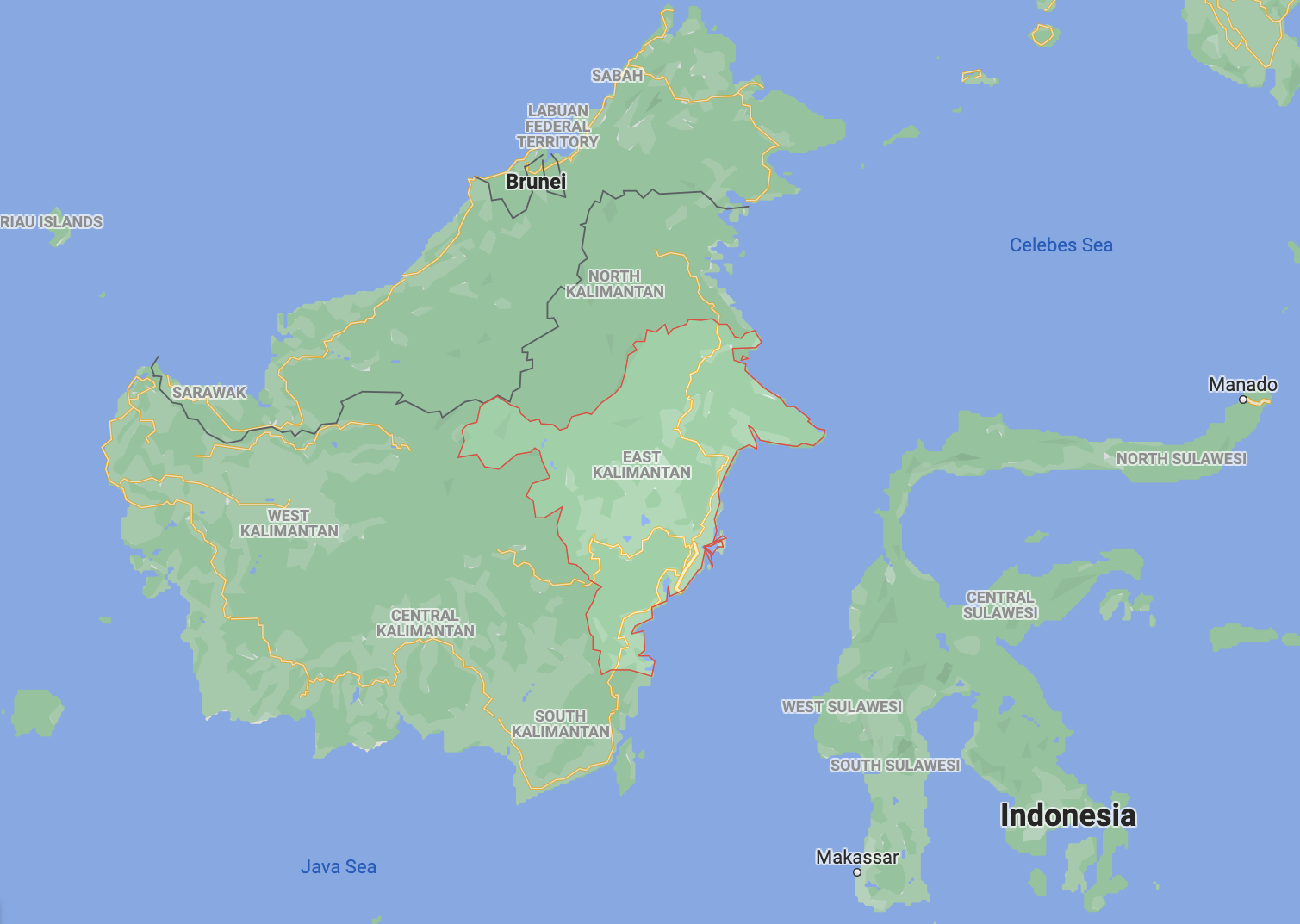
Luhut Binsar Pandjaitan was born on Sept. 28, 1947 in Simargala, a small town in Toba Samosir, North Sumatra. He was the eldest of five siblings of the couple Bonar Pandjaitan and Siti Frida Naiborhu.
Bonar, his father, was a former soldier who later became an intercity and interprovince bus driver. When Luhut was three years old, Bonar brought his whole family along with him to Rumbai in Pekanbaru, Riau. There, Bonar’s luck started to change. Bonar worked for Caltex, a joint venture formed by two American oil companies: Texaco and Chevron (they merged in 2001). Currently, Caltex is known as PT Chevron Pacific Indonesia. The company then sent Bonar to study at Cornell University in the USs.
Luhut later enrolled in the Caltex Community School, which was attended by children of Caltex employees. Because he often brawled with fellow students, Luhut was sent away by his parents to Bandung, West Java, to study in the Penabur Christian Senior High School. There, he became one of the founders of the Indonesian Students Action Union and was involved in the resistance movement against the Indonesian Communist Party and the Sukarno regime’s government.
Luhut was enrolled in the Indonesian Military Academy in Magelang, Central Java in 1967 and graduated three years afterward as the best graduate in the Army dimension. He then started his career in the TNI in 1970.
Together with Prabowo Subianto, his junior at the TNI, Luhut was sent to West Germany to study special counter-terrorism operations. Subsequently, the two of them founded and led the Detachment 81 Anti-Terror Forces in 1983. Luhut served as its commander, while Prabowo was appointed his deputy.
Luhut then joined Soeharto’s presidential security team in its overseas trips division from 1978 to 1988. He was also trusted to assume several high-ranking positions, including as the commander of the Special Forces Training Center in 1993, as well as the commander of the Army Infantry Weapon Center in the 1996-1997 period. His last position prior to retirement was the commander of the Army Training and Exercise Command during the 1997-1998 period. He retired in 1999.
In the beginning of the Reform era, President B.J. Habibie appointed Luhut as Ambassador to Singapore between 1999-2000. The next president, Abdurrahman Wahid, popularly known as “Gus Dur,” appointed Luhut as Industry and Trade Minister. He held this position for a year until Gus Dur was impeached in 2001.
Afterward, Luhut took a hiatus of sorts from government work. He started developing his private business, including setting up PT Toba Sejahtra in 2004 with the support of tycoon Aburizal Bakrie, according to a research by Mining Advocacy Network (Jatam). This company was the holding company for several subsidiaries working in a diverse range of sectors, including energy, mining, agriculture and property.
The main coal mining firms under Toba Sejahtra are PT Kutai Energi and PT TBS Energi Utama (previously PT Toba Bara Sejahtra). As of 2020, Toba Sejahtra controlled a coal concession spanning 14,019 hectares in East Kalimantan with a total production of 5.5 million tons per annum through the two subsidiaries. The production volume, however, is comparatively small to that of giants like PT Bumi Resources, owned by the Bakrie family which excavated 81.1 million tons of coal in 2020 alone. Yet, the most noteworthy thing about Luhut is his tremendous influence among people in government as well as his close connections to other tycoons.
Luhut has been close to President Jokowi since the latter still served as the mayor of Surakarta, Central Java. Back then, the two formed a joint venture called PT Rakabu Sejahtra. This company manufactures wood and exports its final products. Luhut’s Toba Sejahtra is still Rakabu Sejahtra’s biggest shareholder.
Luhut resigned from the Golkar Party to support Jokowi, a politician from the rival Indonesian Democratic Party of Struggle, during the 2014 presidential election. It was a significant move considering at that time, Luhut was serving as the chief of Golkar national leadership office’s board of advisors.
Jokowi won and became the president. Since then, Luhut has played an important role in the national government.
During Jokowi’s first presidential term in 2014, Luhut’s first assignment was to head the Presidential Staff Office. Then, he was reassigned as Coordinating Minister for Politics, Legal and Security Affairs in 2015 before serving as Coordinating Minister for Maritime Affairs in 2016. His last position gave him power to supervise and coordinate four ministries: the Energy and Mineral Resources Ministry, the Maritime and Fisheries Ministry, Transportation Ministry and Tourism Ministry. Thus, when Arcandra Tahar faced a citizenship problem in 2016, Luhut was the one who replaced him, serving as an acting Energy and Mineral Resources Minister.
When he was reelected as president during the 2019 presidential election, Jokowi appointed Luhut Coordinating Minister for Maritime Affairs and Investment. This new position gave Luhut the authority to coordinate seven ministries and institutions simultaneously. Apart from the previously mentioned four ministries, this time he also supervises the Public Work and Public Housing Ministry, the Environment and Forestry Ministry, as well as the Investment Coordination Agency.
Maritime affairs and investment seem to be unrelated. Yet, the decision to merge them under a single ministry is aligned with Luhut’s track record: he successfully attracted investments while maintaining good relationships with foreign investors from China, Japan, and the United States during Jokowi’s first term. One of Luhut’s achievements, which he often boasts about, is the development of an integrated nickel-based industrial compound in Morowali, Central Sulawesi, supported by Chinese investors.
Thus, Luhut has been trusted to hold several other positions in the cabinet. He once served as the acting Maritime and Fisheries Affairs Minister at the end of 2020 after Edhy Prabowo, one of Defense Minister Prabowo’s cronies, was arrested by the Corruption Eradication Commission. After the Covid-19 outbreak, Luhut was appointed deputy chairman of the Covid-19 Mitigation and National Economic Recovery Task Force and coordinator of Emergency Public Activity Restrictions in Java and Bali.
In addition to this, Luhut also currently serves as the chairman of the Domestic Production Utilization Optimization National Team, the chairman of the Proud of Indonesian Products National Movement, and even the chairman of the National Priority Lake Rescue team. All these have earned Luhut the title of “minister of all affairs.” Field reporters often call him “prime minister.”
Luhut continues to expand his influence in the government circle while expanding his business. His position as Coordinating Minister for Maritime Affairs and Investment, which handles the energy and mining sector, raised concerns about conflict of interests because he also owns coal and electricity businesses via Toba Sejahtra.
Luhut’s extensive networks have shored up his personal businesses. He has placed a number of his military acquaintances in positions across his various companies. To name a few: Sumardi and former Religious Affairs minister Fachrul Razi in the Toba Sejahtra’s board of commissioners. Moreover, Sintong Pandjaitan serves as PT Adimitra Baratama Nusantara commissioner, while Suaidi Marasabessy serves as PT Trisensa Mineral Utama executive director and PT Kutai Energi director. The last three companies operate under Toba Sejahtra.
Luhut’s peers also assume influential positions in several other coal companies. Marsetio, a retired soldier who currently serves as Luhut’s defense and security advisor, is the vice-president commissioner of PT Berau Coal Energy, a coal company under the Sinar Mas Mining Group.
Luhut currently serves as the chairman of the Golkar party board of advisors, and some of his fellow party cadres also own coal businesses. Aburizal, Golkar’s board of advisors chairman, still retains his control over PT Bumi Resources, the biggest coal holding company in Indonesia. Golkar chairman Airlangga Hartarto, who also serves as Coordinating Minister for Economic Affairs, is affiliated with two coal companies: PT Bara Hanyu Kapuas and PT Multi Harapan Utama. Then there is Tri Hanurita, another Golkar cadre who is the daughter of Sudwikatmono, former president Soeharto’s younger cousin. Tri is the older brother of Agus Lasmono, who controls PT Indika Energy, the fourth biggest coal holding company in Indonesia.
Pandu Patria Sjahrir, Luhut’s nephew who serves as the director of TBS Energi Utama, currently chairs the Indonesian Coal Mining Association (APBI). All things considered, Luhut has a very strong influence in terms of formulating mining policies and coordinating coal businesspeople – all of which definitely help him leverage his own coal businesses.
***
Researchers: Viriya Singgih, Mawa Kresna
Translator: Sebastian Partogi
Editors: Mawa Kresna, Evi Mariani, Sam Schramski (EJN)
This article is part of the #EnergiKotor (#DirtyEnergy) reporting series supported by Earth Journalism Network through its special collaborative journalism project “Available But Not Needed,” which brings together six media outlets and more than a dozen reporters across seven countries to explore how public and private investments continue to fund fossil fuel economies in Southeast Asia.


